#& see it being canon that he has trauma & ptsd… possible c-ptsd
Text
SBG GANG MENTAL ANALYSIS
sorry for the delay!
alright, gotta say... this one's a bit shorter. but the next will come like a train wreck i promise😇
Part 3: Ben Clark
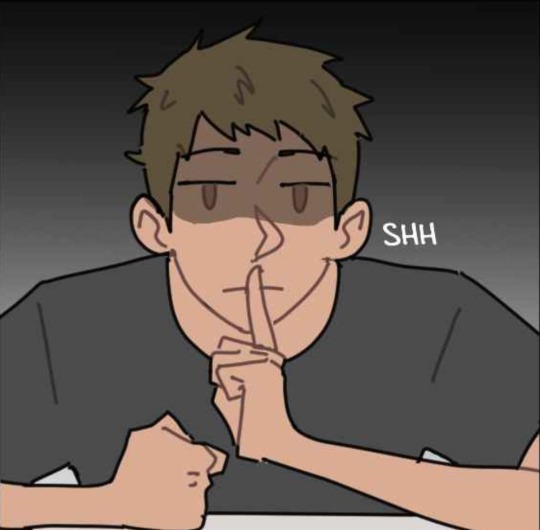
oh the sweet old Ben... a kind and loving soul muted away. I'm thinking of inspecting his trauma and his general actions, and give him a diagnosis which I'm sure is canon even. I'm sure everyone who knows the disorder itself is aware that Ben is, in fact, suffering from PTSD.
let's start. first, what is PTSD?
PTSD, or Post Traumatic Stress Disorder, is a mental condition where someone feels what they have previously went through in a past traumatic experience. PTSD is frequently found with flashbacks to the moment, overwhelming feelings and sudden responses. there are two types of this disorder, PTSD and C-PTSD. but we'll look in the first one for now.
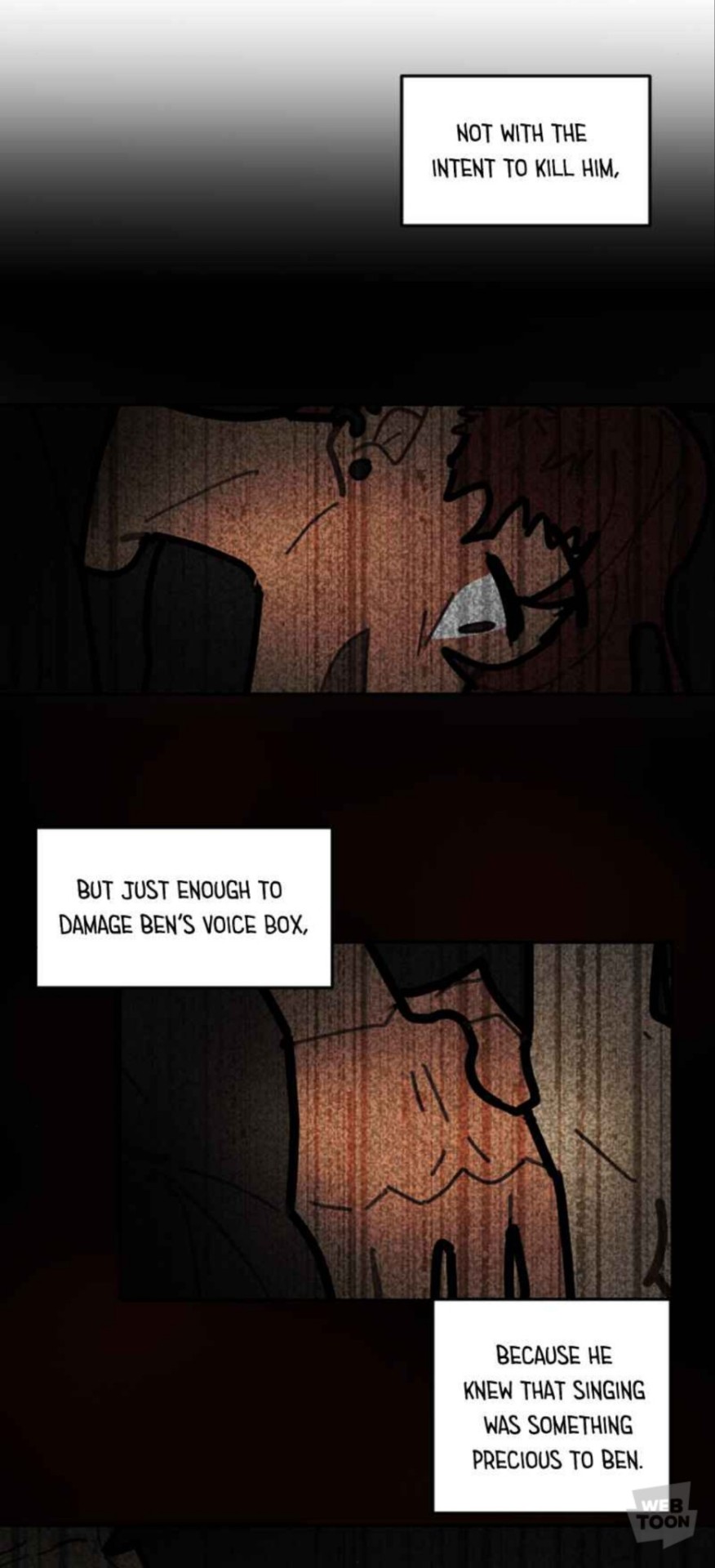
Ben has always been a really kind character. ever since the beginning. more of a 'gentle giant' type of character, though we never see him talk. he's soft, he loves to help his friends and never does anything vulgar around them, including the phantom dimension. he feels nice when he gets praised even if he doesn't show it too.
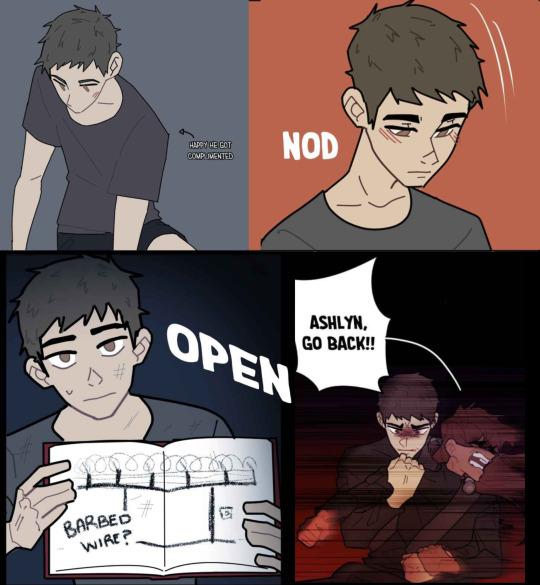
the first time we see him getting flashbacks and his anger issues being visible is when we first see Barron's behaviour towards Logan. anything that includes actual bullying gives him flashbacks and his response is his anger issues unleashing.
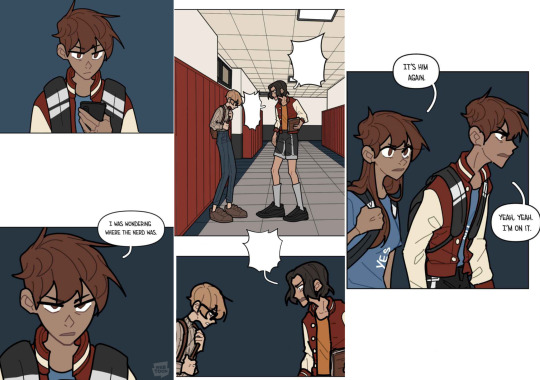
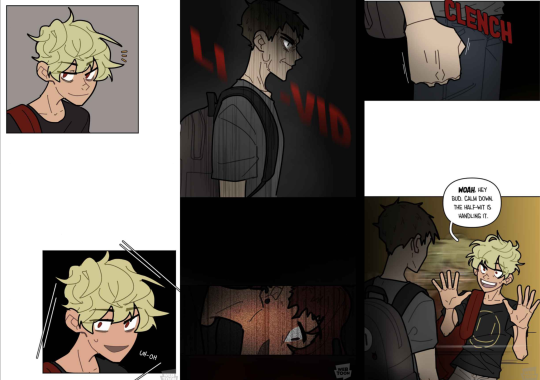
in his backstory, Ben is shown that he's more of a shy type of person, but he loves singing. because his tall and intimidating appereance doesn't match his softness, a group of dumbasses try to 'fix' him which he rejects. back when Shane strangled him, is what he gets flashbacks to. it was something that changed his entire life, he had a passion for singing but he never did with his damaged voice. god knows how many times he was hospitalized when he was going around to fights because of his outburst of rage.


yep, rage. I'd classify his anger issues as the 'rage' type with PTSD. PTSD rage makes more sense to me than just normal anger problems. I've seen and lived with many people with anger issues, but none of them are similar to rage. anger problems in general are usually verbal, if you don't make them mad to a point they're all bark and no bite. but of course after a point the violence behind the generic anger issues can unleash (see Tyler)

okay, back to Ben and rage. rage is an extreme condition of anger, the person gets violent and their thoughts are clouded with the rage which makes them not think before doing anything drastic. but he's not very closed off about it either, actually. the time where he accepted Aiden to do the storytelling was before the first half of season one, the gang wasn't even that close.
this means that he saw them as actual friends so early on. probably before everyone. Ashlyn took her sweet time accepting the friendship, I'm kind of sure that Aiden didn't at first (see Tyler, yet again), Tyler also definitely didn't (as said by Taylor in season two premiere) and I think Logan has attachment/trust issues but that's for later. the only other possible person that might accept the group fastly is Taylor but with Tyler's influence so close to her, there is also a chance she didn't at first.

Ben was fine with his friends knowing his past. he put his earphones on because he didn't want to hear about it, or else he knew he'd get flashbacks yet again. I'm thinking that it could be diagnosed too. Aiden knows that it's not just a memory, it's flashbacks to Ben and he covers for him whenever he sees something that might trigger Ben. after learning the situation, Taylor also does the same. they learn the severity of his problems and are all fine with helping him.
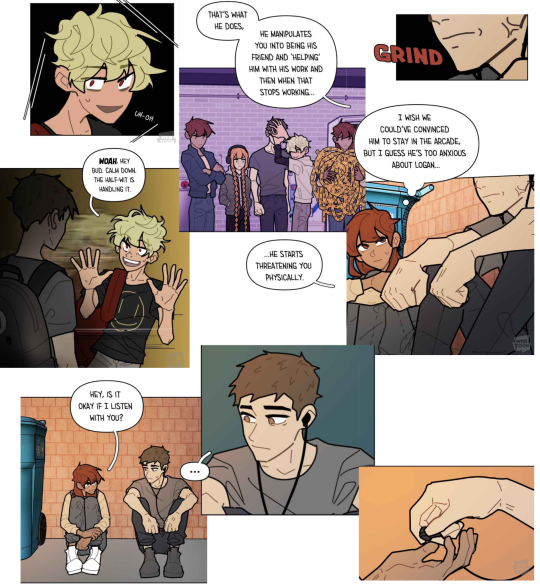
another thing I'm sure of is that he's extremely attached to his friends. we know that everyone is close-knit, but Ben specifically. he might not speak but that doesn't mean that he doesn't enjoy their time. he does, fully. which is I think why he/his room was... like that in the facility, without any spoilers.
to say, the gang is more than just friends to him; they're his found family, where he feels like he belongs. they don't judge him for his silence there. they understand his past. they're not scared of him just because of the way he was built and they're not going to be either.
but what about his family?
families are one of the most important part of a character and their backstory. the family is what decides how they will live, act and even feel sometimes. then what about Ben's? where were they during his backstory?

yeah. Ben's rage causes something terrible to happen.

but it ends better for everyone. Ben gets the therapy he needed, starts to live with Aiden, makes the gang his friends and it actually goes well.
his parents?
we meet Naomi and William during Lily's birthday.
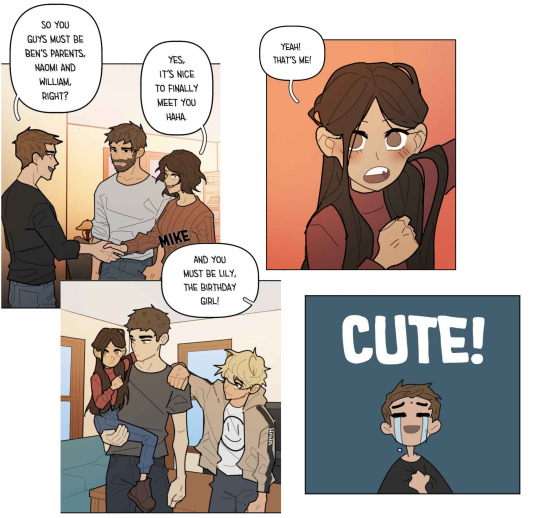
yes, Mike, Lily is goshdarn adorable.
first, I think Naomi and William aren't to blame. I think they did the best they could; they tried to help Ben, tried to help him get therapy, sent him to Aiden's place to help himself. then why didn't Ben's story stop?
Ben couldn't control his rage until their house got destroyed and he realized just how far it got. he sneaked out of the house, a lot of people seem to not see that detail. and they seem to be very caring, too.

they're amazing as a whole family, to be honest. even the little Lily doesn't care about her birthday getting wrecked, because she wants to help Ben and his friends. she indirectly helped Tyler extremely well, since the sedative idea came from her in the first place.
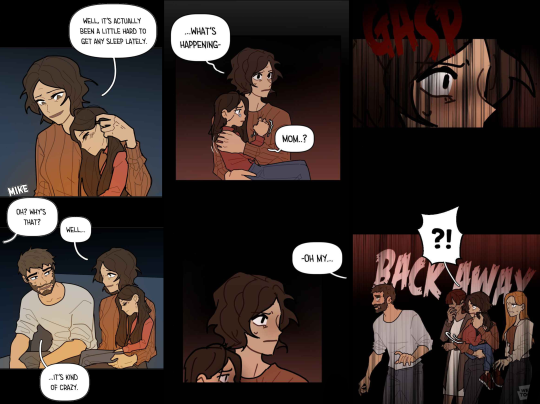
Naomi was the first person who brought up the whole 'we-are-seeing-phantoms' discussion and William didn't hesitate to talk about it. Naomi was also the first person to notice the phantoms when the worlds collided for a mere second.
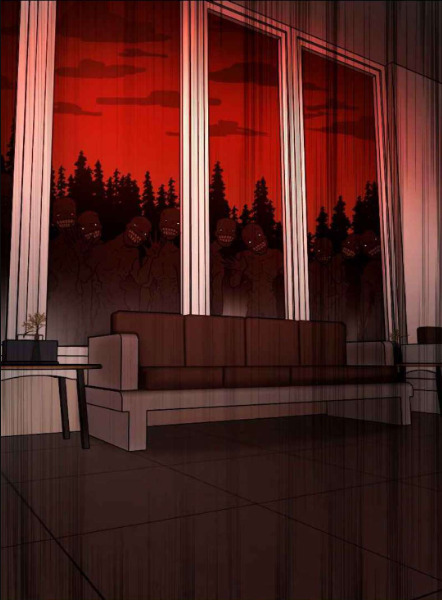
and Ben himself has shown completely zero negative behaviour towards them. and Lily gets treated like a princess -even if she accidentally neutered Ben-

side note here, that Lily also really loves the family too. the way she cuddled Aiden when he died and came back was so cute to be honest.
so I don't think the family is anywhere to blame either. it was Ben who was strangled, Ben who fought, and Ben who saw therapy. the reason why I'm talking about this is because a lot of people suddenly blame a character's family when there's a problem with them.
guys. people with caring, loving families can be traumatized too. just because someone has a happy family doesn't mean they're suddenly over any trauma they live. doesn't mean everything is suddenly okay. it means that they have an accepting place to go to, a safe space. and Ben's family? I think they're just like that. they desperately try to help. help their son, their nephew and their friends. hell, Lily trying to help also speaks volumes in my opinion. their father -dilf no.2 after Mike right here- William was the one who offered the idea to get the kids saved from the centipede phantom. and to be honest? it was pretty smart.

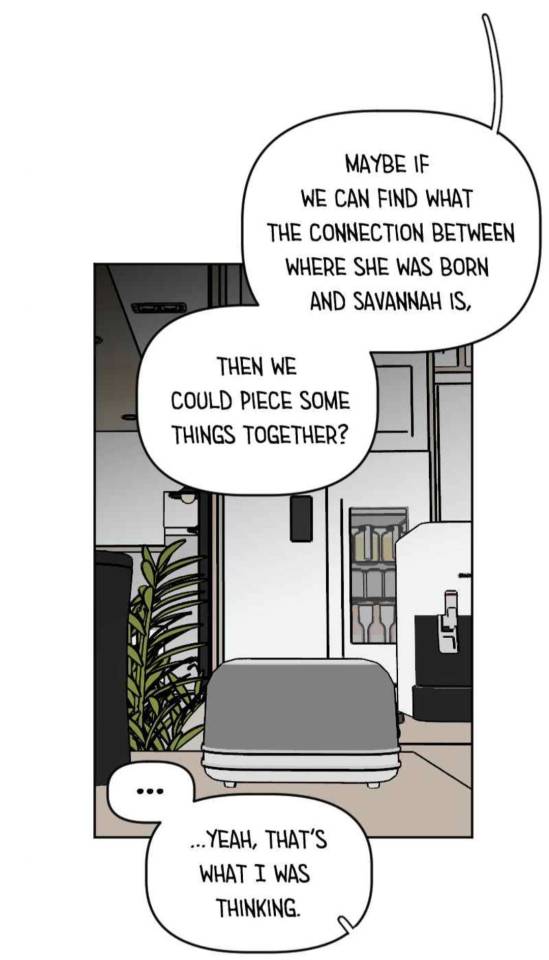
she also tried to prevent Emma from going mad because come on, Emma would absolutely wreck anyone if they dared blame Ashlyn for this. (still I think Jessica has to apologize for being to insensitive smh)
Naomi really seems like a sweetheart to me, I already said what to be said about William in a single very important side sentence and if there was any kind of in-family neglect Lily would also be affected. but she isn't so I think we're good? I adore the whole Ben family tho.
to wrap it all up.
Ben is suffering from Post Traumatic Stress Disorder which makes him see flashbacks and turn into a rage mode each time he is triggered due to his backstory, being bullied because he's too soft. his rage causes a gang to destroy his home (HELLO?? ARE THERE NO FUNCTIONING COPS IN THIS STOR-- oh wait it's america yea there ain't nvm) and his parents try their best. move, get Ben to therapy and let Daniel's side help him by doing stuff he loves. Ben is still trying to recover, but his flashbacks are strong due to impacting his entire life from his voice and make it difficult.
(vocal chords repair by time actually, but he hasn't been speaking for like 4 years so maybe it'd need some voice exercises until it returns to normal?? if it's just vocal chords he'd be alright. imagine if he could talk and sing normally all this time but he just didn't know. it's something between "aww poor guy :((" and "lmao"
but I don't know about voice box, can someone enlighten me on vocal chord damage vs. voice box damage? thamks)
and Lily. Lily is a cinnamon roll. no other opinions allowed.
-i wanted to make a part for Ben and Taylor but i decided wasn't fit here :P-
#sbgblr#sbg (webtoon)#school bus graveyard#school bus graveyard webtoon#schoolbus graveyard#sbg#sbg ben#ben clark
73 notes
·
View notes
Note
C-PTSD as a diagnosis makes so much sense for Ford because he really does fit almost all of the criteria, ESPECIALLY if you take the stuff in J3 into account in conjunction with his traumatic childhood (bullying, bad dad, etc.). It just makes sense in regards to his motivations and his issues with interpersonal relationships (like with Stan). Also buring yourself in your work (like he does) is a very common 'flight' coping mechanism to trauma in adults

I'm smiling like this right now

ford's whole.... mental health deal is extremely interesting to examine because Oh my god this man is the textbook image for "reacting to ongoing, continuous trauma". intentional or otherwise (I'm inclined to believe it's both).
like. okay hang on I'm about to get very in depth with it
I feel like there's no way this entire guy's life and in some ways his lasting identity haven't been defined by and constructed around various forms of trauma, maybe the most obvious and true-to-canon-intent being peer abuse/bullying from childhood. a lot of people downplay the impact of this type of abuse but it's... responsible for a lot of social ills in shocking ways. (if you're more interested in this topic here is an article my friend mer linked me a while back, it gets into it very deeply)

(a lot of this is going to be sourced from the wikipedia page for CPTSD [and my own experience Living with it] which I realize isn't very professional of me but Whatever this is tumblr)
one of the core tenets of ford's personality is that he's Different. he owns it, sure- his six fingers become a point of pride rather than something to be ashamed of- but they make it extremely clear that from a young age he associated being different with being a social pariah. ford's generation was characterized by notoriously cruel bullying, and anything that remotely made you stand out rendered you a target. ford could've been bullied for being nerdy and jewish (and failing to perform socially, ie dating) alone, having such an obvious mutation definitely was not winning him any points.
so it's honestly no surprise, when from childhood ford feels like he has One person in the world to trust and confide in, that he would go on to form very unhealthy attachment patterns typical of CPTSD. as you elaborated on regarding AvPD (which I know far less about but seems to have comorbidity with CPTSD): if you're hard-wired to believe socializing with others results in failure or betrayal, then you're not going to make an effort. but what does end up happening is that you're going to pour all of your trust and dependency into one person at a time, one person who is "safe".
previously, that was his brother. and it's not really hard to draw the conclusion from there that fiddleford was a subject of ford's attachment style, considering he was his One friend from college, and... one of Maybe two people ford is friends with at all who he isn't related to. he cites him as the only person he can possibly trust to work on the portal project alongside him, and he still can't bring himself to tell him the full truth, because he's terrified of losing him. I love their dynamic (I do think they were mutual best friends, and there was no small amount of trust reciprocated between them. "fiddleford was weird as hell too" is something I keep coming back to) and I don't think it's built on entirely unhealthy terms, but that kind of pressure is... setting things up to crash and burn.
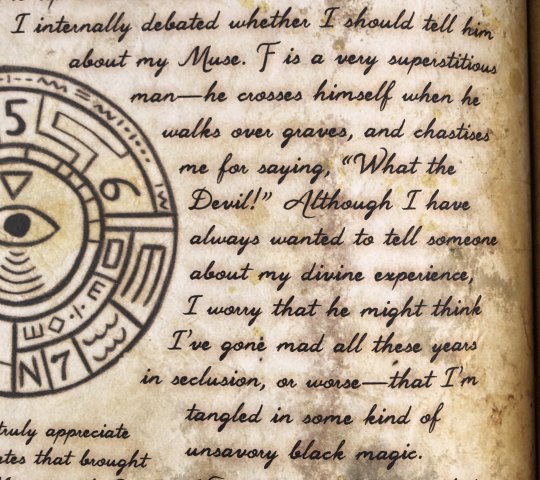
enter bill stage left. back to "continuous yearning to be liked and accepted"- this guy knew that and made every effort to prey on ford's insecurities to reel him in as close as possible. this is what really pisses me off about the idea that bill was just "inflating ford's ego", because it's way, way more insidious than that. throughout the entirety of journal 3 we see ford reintroduce someone to his life he has a very positive relationship with (fiddleford) and how that trust gets gradually broken down by bill's influence "winning out" over their friendship. I think it's safe to say ford was already vulnerable: from the start, he'd been isolated in his research for six years (and it's unclear for how long he'd known bill by 1982), and bill proved time and time again to be someone who wouldn't judge him, someone who would praise him for his hard work, and perhaps most critically, make him feel like being different was something special.
like that's... that's really not good!!!! and that kind of thing works wonders on someone who has already settled with the idea that they're inclined to be alone just by design.
trying to put a cap on this. in relationships like the one he's had with his brother or fiddleford it doesn't even necessarily have to be ""toxic"" (vague term anyway) or outwardly bad to be built on unhealthy attachment patterns, and considering for a good chunk of ford's life his attachment to others can be characterized as "I can only trust ONE person at a time" it feels essential to any discussion of his CPTSD or canon trust issues. That is something that happens a lot in Real cases of CPTSD (hi) and only further snowballs into More trauma by leaving you vulnerable to manipulation and abuse (see: bill.)
I've been going on for way too long now and I feel like I've only scratched the surface of the thing I wanted to elaborate on sorry. that post traumatic stress disorder can complex

#lab notes#I woke up and had to answer this before anything else but I really need to Eat so apologies if this is all over the place. running on empty#edit: this is ok to reblog ! all of my gf theorizing/analysis is unless I clarify it isn't for whatever reason
101 notes
·
View notes
Text
Some of the discussion that happens within the Star Wars fandom, particularly discussion of the Jedi, can be really upsetting to observe if you have certain disabilities. In fact, I’m having a hard time even liking the Jedi right now because I can’t help but associate them with some really ableist takes that I’ve seen in their defense.
Let me explain: a lot of people with certain disabilities (such as autism, ADHD, bipolar disorder, and C-PTSD) deal with something called emotion dysregulation, which means that you feel emotions more intensely than the average person and that this strong emotional state sticks around for far longer than it should. When you have emotional regulation issues, an event that might make somebody else a bit sad or mildly frustrated has the ability to put you out of commission for hours or even an entire day. Emotion dysregulation is very stigmatized, even in people who go out of their way to avoid harming people or lashing out while dealing with an episode. People with this specific issue are often told that they are “dramatic”, “attention seeking”, or “future abusers” for what amounts to an automatic emotional response that a person cannot control. This constant pushback forms a metaphorical blister that can easily be popped back open when you see anything that reminds you of what caused it in the first place.
Now, let’s move on to the Jedi. While it can be argued that their teachings were intended to instruct people to reign in their BEHAVIOR as a result of their emotions, several lines in the fist six movies sound an awful lot like they are condemning having negative emotions at all. Yoda literally tells both Luke and Anakin that emotions like fear and anger BY THEMSELVES are of the Dark Side, and these lines were very difficult for a lot of people who have dealt with trauma, neurodivergence, or other issues that cause “big emotions”. These lines, intentionally or not, mirror a lot of the things that real people have said to those of us dealing with emotion dysregulation, and people have every right to talk about this in their own spaces unmolested.
Some of the defenses of the Jedi in the context of how they are instructed to deal with their emotions come off as dismissive at best and ableist at worst. Yes, if you dig through Star Wars canon enough, you can find portrayals of the Jedi and emotions that point to a more nuanced view where choices and actions are the source of evil rather than the emotions, but this does not change the fact that the Yoda lines and other emotionally repressive applications of the Jedi Code very much exist in parts of canon. A person who found the emotionally repressive variant of Jedi teachings to be upsetting due to a disability will likely feel as though you are trying to dismiss their feelings and belittle them if you “correct” them for “misinterpretation of the Jedi”. I get that it sucks to see people bash your blorbos, but if someone is doing it because they are dealing with something IRL like trauma or ableism, then it’s best not to engage and just let that person work through it.
I have also seen people who are defending the Jedi make statements that outright attack people for having intense emotions. I remember a take that basically said that you were a baby or a psychopath if you found the Jedi code regarding emotions to be “too hard”. I’ve seen people dismiss the trauma that Anakin went through and its possible effect on how he reacted to some aspects of the Jedi order in a way that mirrors the invalidation that those of us with emotional regulation issues have experienced for being “too much” for all of our lives. Yes, it is important to avoid harming others when you are in a bad place, and no Anakin was not a great person, but so many of these takes are devoid enough of nuance that they read as if they are just trashing people who have “too many”emotions.
Feel free to defend your favorite characters all that you would like, but please spare a thought for those of us who might not dig everything about them for reasons connected to disability and trauma. The Jedi aren’t real, but we very much are.
97 notes
·
View notes
Note
headcanons for an Mc with cptsd and the brothers accidentally trigger them? (Not during the actively violent parts in the Canon game....just little things that remind them of trauma.)
Ah yes! I can definitely do this! As someone with C-PTSD, It is something I see in fics a lot that I havent ever felt relatable to my own experience so I will try to reflect that in here for anyone else who's experienced the same thing in the fandom! (I've been thinking about making this into a series as well but its on the backburner for now until I finish the main two I'm working on)
The Brothers Accidentally trigger Mc's C-PTSD
Fandom: Obey me
Genre: Hurt/Comfort, Headcanons
Written for GN!MC
CW: C-PTSD, panic attacks, Self-injurious behavior (e.g. hair-pulling, head-banging, scratching), implications of past abuse, somewhat suggestive on Asmo’s part, spoilers for lessons 16+
Lucifer
He, frankly, has no idea how we got here.
One minute they were fine, but the next Mc is shaking violently and sobbing.
When he tried to approach uou for comfort, you began screaming "No" at him and completely backed yourself as far away as possible
Lucifer is usually pretty insightful but it will take him a few minutes to figure out what it is he did wrong.
Eventually he will realize that it was the way he raised his voice at Mammon after he tried to swipe one of his priceless vases from the common room.
He will approach you slowly, soften his voice as best he can, and try to calm you down by getting you to take deep breaths.
He won't get too close at first for fear of having you bolt on him, but as you come down from the panic he will slowly inch closer.
Once you're lucid enough, he will apologize and ensure that aggression was not directed at you, and that he wasn't going to hurt you.
Lucifer will also offer you physical comfort if you want, holding his arms out for you.
He will completely abandon all of his tasks and take you to either his room or the study, and will spend the rest of whatever is left of the day listening to calming music with you.
He will make you whatever your calming drink of choice is (tea, coffee, hot coco, warm milk, etc) and ensure you're drinking enough water.
He will play games with you as a distraction. Chess, checkers, cribbage, mancala...(really whatever game you want to play)
He will also ensure you have some tactile comfort, whether that be a feather from his wings, one of the plushies he won you from the Carnival, or the gyroscope in his office.
If you want to talk about it, he will be there to lend an ear. Really he wants to learn more about you and other humans, so this will be something he is very intently listening too. He may ask some questions, but will only have you answer them if you feel comfortable doing so.
He will ask what your triggers are so he can avoid doing something to hurt you- even if they go against his usual nature.
Expect him to be very careful from now on, chosing his words carefully and watching his tone the next time he gets angry at one of his brothers and you're around.
Mammon
He really doesn't mean what he says when he insults you. He just is too embarrassed to admit how he feels.
But when he tells you your useless and stupid for the hundredth time, it finally makes you snap.
He stands there dumbfounded after you run away from him sobbing, not really knowing what to do.
After he snaps out of his daze, he immediately goes to find you. He had gotten into the habit of the insults, and you would never really give a response other than a wince and going quiet.
Well...now that he thinks about it, that's maybe a sign it has been grating on you.
He finds you in your room, sobbing relentlessly on the floor with your arms scratched up to hell and back.
At first he panics- seeing you hurt yourself terrified him. He rushes over to you and tears your nails away from your arms.
When you begin to beg him not to hurt you and profusely apologize for being "just a stupid fuck up", his heart breaks.
He would apologize relentlessly and admit to you everything- why he insults you all the time, how worried he was, how much he loves you.
He would do his best to calm you down (I say do his best because he may end up making it worse before he realizes what you need)
From here on out, he definitely would be more mindful of the insults, trying his best to be open with you about his feelings, or at least be more gentle with his teasing.
There may be times when he slips up, but he makes sure to atone as best his can
He would also be very sensitive to when others insult you, making sure to immediately come to your defense. He would also take you aside afterwards and remind you just how much you mean to him, how smart you are, how helpful you've been to everyone, etc...
Levi
In hindsight, Levi should have seen this one coming...Of course he would fuck everything up
He wanted to be closer to you, but he remembered that being closer to someone entails you seeing his deeper flaws...and well...his impatience and easily triggered frustration are definitely some big ones.
But even so...your reaction to him throwing his controller and yelling when he dies the thousandth time on his new game seemed to be way over the top.
One minute you were sitting excitedly in the chair next to him, watching him game...and the next you were literally cowering in the furthest corner of his room and shielding your body from him as best you can.
He tries to approach you, but your screamed apologies for what you'd "done" to "make him angry" make him halt.
After a few moments of gears turning, it clicks to him that you've experienced something like this before...but directed at you.
Cue the festering guilt. He never meant to hurt you...damn these video games, you're more important to him than some stupid boss fight.
He will likely text one of his brothers (either Lucifer or Satan) and ask what to do, because he is terrified of hurting you more.
Once he has an idea of how to help though, he will be very calm and gentle, albeit nervous. He will likely offer you tactile comfort- like his Ruri-Chan pillow, or letting you pet his tail.
Once your comfortable enough, he'd hold your hand and make sure you know you've done nothing wrong, and that this is something he needs to fix himself.
And he will work on it, but it will take a bit of time. Old habits die hard for Levi, so he will have to be very intentional about his work on his irritability, and will probably opt for easier games when you're around to avoid outbursts.
Satan
This is the exact situation he'd feared would happen.
It really was an accident...and Satan knew that. But he just couldn’t help getting angry when you knocked over a stack of rare books... especially after one of the books ended up ruined by one of his absentmindedly placed candles.
His room was always a mess, and even he knocked over the stacks of books littering the floor from time to time...and besides, he was the one who insisted you come to his room to read because he found the clutter in his room more comfortable, so he knew a lot of the blame fell on him.
Regardless, he was so used to lashing out at others and blaming them for his upset, that his anger came out directed toward you.
He impulsively snapped at you, scolding you intensely for being clumsy, careless, and unaware of your surroundings.
He regretted the words the minute they fell from his mouth as your eyes grew misty with tears and your body began to tremble...He must have raised his voice louder than intended.
He tried to apologize immediately but you flinched when he approached. His heart ached when he say you jerk your body away from him so violently, as if you were afraid he would lay a hand on you.
He stood, dumbfounded, as you ran from the room in a fit of uncontrolled sobs and shuttered breathing.
He caught up to you quickly though, because- in your re-activated state- you became disoriented in the spiraling halls of the HOL.
He found you on the floor in the music room, curled up against the Grand Piano as you rocked yourself back and forth and cried.
He would hesitate to approach you, worried he may frighten you more...but after hearing your hyperventilating become worse, he sucks back his anxiety and approaches you cautiously.
He would sit next to you- as close as you’d allow him to get- and gently reassure that you were safe and that he wasn’t going to hurt you.
He would try to help guide you through some circular breathing exercises, finding that doing it with you helped ease his worry as well.
Once you were breathing evenly again, he would apologize about his reaction to the accident, taking the responsibility of ensuring his room is free of hazards that could get in anyone’s way regardless of if they were clumsy or not.
If you weren’t able to talk, he would try to help you communicate how you could - squeezing his hand to yes/no questions, ASL if you know it, or in drawing/writing.
He would offer to go on a walk if you still found yourself activated, doing his best to help you back down mentally. If you didn’t want to leave the house, he’d have you help him make some tea and some baked goods to distract your thoughts.
Satan would definitely opt to read in your room or the library with you more often than not because he cant trust himself to ensure his room is clean enough, and he tried his best to continue improving his anger-management techniques he learned from some self-help books.
Asmo
Asmo is a bit confused as to what’s happening with you, and that fuels his own worry.
Did he do or say something wrong? One minute he was kissing you on his bed, making slow efforts to explore your body...and the next you’re screaming for him to get off of you and to stop.
Obviously he listens. He wouldn’t ever dream of hurting you. Just the thought of it tears him up inside.
He tries his best to comfort you- trying to hold your hand, give you a hug, or give you sweet kisses to calm you down, but it ultimately makes things worse.
It isn’t until you lock yourself in his bathroom that he starts to try to put the pieces together. Once he realizes you’re experiencing reactivation, he will feel terrible for not figuring that out sooner.
He wont intrude into the bathroom, but will speak to you through the door. He will do his best to present himself in a non-threatening way, reassuring you that he isn’t going to hurt you like others had in the past and apologizing for not recognizing what you needed.
After he hears your sobbing cease, he will announce he is entering the bathroom. Asmo will be very careful in opening the door slowly, announcing his every action before he does them.
When he sees the fistfulls of hair stuck to your hands and scratches littering your face and neck, he will have to fight the urge to wrap you into a tight hug- reminding himself how that only worked to make the flashback more real.
He will ask to touch you before he does. If you give him permission, he will gently stroke the areas where you had hurt yourself, muttering healing spells over them as he does.
If you try to talk to him, he hushes you. He doesn’t want to hear any apologies for the trauma response and he want’s you to rest yourself in every way.
He will offer to draw you a bath if you’d like, not pushing you to even have him in the room while you relax in the warm water.
If you want him there, of course he’d be there though. But if not, he won’t give any objection. Instead, he will gather as many soft things onto his bed as he can, and get anything you need to feel grounded.
Soothing music or sounds? It’s queued up. Sensory toys? He’s already grabbed a bunch from your room. Calming oils/scents? He’s lit 40 candles already, don’t you worry.
After you get out, he will help you into a nest of blankets and pillows and hold onto your hand while you relax, doing what he can to help. Anything you ask of him, he’s right there to grab it- and he is going to always be reassuring you that he’s not mad or upset with you.
Beel
He didn’t really expect this to happen when he gathered you in his arms for a tight hug after having a long day at RAD.
Perhaps it was the hazy gloom in his mind that made him forget to ask permission before touching you- like he usually does. He would ask to touch you out of courtesy before and wanting to respect your personal space, but now realizes he needs to do it every time because of this.
The minute he wraps his arms around you from behind In the hallway, you yelp loudly and squirm out of his grasp. In the process, you manage to contort your body in such unnatural angles in a desperate attempt to get away from him...so much so that he’s worried you seriously injured yourself.
But when he reaches out to your shoulder, you yelp once more and back yourself as far away from him as you can.
Everything about you looked and felt panicked. The labored breathing, wide eyes, relentless tears, and shaking body.
Beel felt his own nervousness rise at your response. He hadn’t intended to hurt you, and he was worried you thought maybe he was trying to.
Against his better judgement, he reached out again to try to comfort you. This time though, you jolted backwards, slamming your head against the lockers behind you.
Beel panicked, fighting the urge to cradle you in his arms while also trying to make sure you were okay.
Before he could really make any concrete observations though, you began screaming at him to get away from you- catching the attention of other demons in the hall. Beel would also be panicking, desperately trying to look around for one of his brothers to help.
Likely either Satan or Lucifer would be the ones to calm you down, getting you grounded back to reality by taking you into a less crowded play (Satan would likely bring you to the library, Lucifer would bring you to his office).
Beel nervously looks on while they practice the grounding techniques with you, taking note of how to help you in the future.
After you’ve calmed down, he would profusely apologize to you for not realizing he had hurt you and having no idea what to do. Even if you say you forgive him, he still feels very guilty.
He would be open to talking about your triggers and identifying what helps when you are reactivated. He would also go out of his way to learn more and teach his other brothers should they accidentally trigger you as well.
Belphie
Well, it is simply said that whoever your MC is with C-PTSD...seeing Belphie in general is probably a pretty huge trigger.
For the sake of these headcanons though, lets just say that you were able to move past the whole “He killed you in a very gross way and then tried to act like nothing happened” bit that is canon in the game, but that sometimes him cuddling you too tightly triggered you pretty severely.
He would be uncertain how to respond when you suddenly seize up and go completely catatonic when he tries to cuddle up next to you in the attic when you both lay down for a nap.
And Belphie would probably notice pretty quickly. He’s very observant, especially when it comes to you and Beel.
He thinks at first he may have squeezed you a little too tight and you were just uncomfortable. He may crack a joke about you needing to relax because a firm pillow just isn’t comfortable, right?
But he casts all jokes aside when your body begins shaking violently beneath him, and he sees your thousand-yard stare with tears cascading from your eyes like waterfalls.
At this moment, he panics. He doesn’t know what’s happening, and he’s very scared. At first he may think you’re having a seizure.
When he brings his hands to your face to try to hold your head still, he becomes even more concerned with the way it sounds like you can’t breathe.
He would ultimately call on one of his brothers (likely Beel) to help. Once Beel is able to get you to calm down (thanks to what he’s learned from Satan and Lucifer), Belphie would be eerily quiet.
During Beel’s attempts to get you to relax, Belphie overheard him quietly murmur that Belphie wasn’t going to hurt you again, and that would ultimately shatter his heart.
Sometimes he forgets just how much damage he’s done to your psyche, despite the fact that you had forgiven him.
He would probably leave- at least for a bit- because he’s worried about re-triggering you. You would either have to seek him out again yourself or get Beel to bring him back to you.
After a long talk with many apologies on his end, you’re able to make peace with it. Belphie understands he can’t undo what he’s done, but he wants to learn how to make things easier for you.
He will do what he can to help you when you’re triggered, and get whoever you think is the most helpful at helping you down from reactivation- because he knows it wont be him.
He would also make an intentional effort to be even more observant of your moods and physical movements for signs that you may already be in an elevated state that he may make worse.
Overall, he just really doesn’t want you to associate him with the terrible things he’s done anymore...but he doesn’t blame you for it.
#obey me!#obey me#shall we date: obey me#obm#obey me swd#obey me lucifer#obey me mammon#obey me leviathan#obey me satan#obey me asmodeus#obey me beelzebub#obey me belphegor#obey me belphie#obey me beel#obey me asmo#obey me levi#obey me headcanons#obm headcanons#headcanons#obm hurt/comfort#obey me hurt/comfort#hurt/comfort#gn!mc#gn!reader#obey me gn!reader#obey me gn!mc#obm gn!mc#obm gn!reader
454 notes
·
View notes
Text
You know what time it is! It's physco analyzing owl house characters time >:) tw for discussions of mental illness, trauma, etc. And spoiler warning for s3!
Part 1: Hunter (he's my favorite ok)
Something I love about the owl house is its various depictions of ptsd- pretty much all of the characters have gone through multiple traumatic events but were all affected individually and differently, just like how real people would. It's also pretty obvious that the level of trauma is dependent on how much support the characters had from other people in their lives.
The most obvious example would be Hunter, who has had no support until meeting the hexsquad- he's seen in the show displaying blatant symptoms of c-ptsd from years of abuse and neglect. He's been not only subjected to grueling training and manipulation but also extreme isolation which, speaking from personal experience, is very damaging.
He's also a cult survivor which I think the show has handled very well- everything from the paranoia and panic attacks about running away to the subconscious self-righteousness that the emperor's coven instilled in him (evidenced in things like "I was in the *emperor's coven*. I can handle a little pain 😌". He learned a lot of untrue things about the world while in the coven and is seen having to work to consciously deconstruct those ideas and learn the truth, just like a real cult survivor would.
It's also clear he was gaslighted by the way he talks to others in thanks to them, by ending a lot of things he says with "It's not in my head" or "you believe me right?". I think Hunter would very likely have DID and I see a lot of traits in him (such as the golden guard persona he seems to have), though I sadly don't think that will ever be canon. I would love to see more good rep for DID as part of a system myself though.
He also has a lot of autistic traits though I go back and forth a lot on wether or not I think he's actually autistic. He clearly has trouble making friends and understanding social cues but thats a natural effect of being isolated for a long time so it's unclear if that's from the c-ptsd or possibly autism. He's very passionate about his interests and loves to learn and talk about them but his interests are also pretty widespread and diverse. It's still not gonna stop me from projecting my autism onto him though >:)
Tune in for part 2 where I actually talk about characters other than hunter lol
#toh#the owl house#the owl house spoilers#toh spoilers#toh s3#toh s3 spoilers#toh speculation#another thing i love is the way animal death is portrayed as a traumatic event for him too#like ive experienced a lot of animal death and loss in my life and that is absolutely traumatic#though its almost always dismissed as being 'not that bad'#idk i just really appreciate that :')#i project so much onto hunter slgkfjg#we have so much common its worrying
30 notes
·
View notes
Text
I was thinking about my Shimmer!inspired Velocity, Visceral... I was like... Ohhhh. This is Vel's dark super sonic form, isn't it?
I mean, I think about my other muse, @spinb0t; he's a bad end version of Sonic, where he was roboticized and is the head enforcer for Eggman's empire-- but the reason he exists is because Sonic's goodness, his compassion, his kindness, his selflessness have all been inhibited... and all that's left is this ego-driven, self-absorbed lunatic who can't feel anything but sadistic glee at the suffering of others... all of his resentment running wild because he can't control it, plus he's under Eggman's control.
Visceral would be a manifestation of Velocity's resentment-- she's selfishness and schadenfreude (delighting in the misery of others) personified. Vel thinks she does a good job of hiding her anxiety, her PTSD, her lack of taking care of herself, but in actuality, every time she bottles something up or pushes her thoughts down, her resentment of the very people she is protecting grows.

If she were to be corrupted, then the next time she turned Super, it wouldn't be the beacon of hope and kindness that Super Velocity represents--

It would be the searchlight of trauma and selfish delight over how much she DOESN'T CARE about anyone... V I S C E R A L. Her namesake inspired by the intensity of feeling one might have upon seeing someone at their rock bottom.
It's not how she REALLY feels-- Vel really does love her friends and love the world, but resentment is a feeling that can grow when needs aren't being met. Her friends and family want to help her, but she won't open up and is afraid of disappointing everyone around her-- because she holds herself to ridiculous standards. (I think Steven Universe Future handled this extremely well and mirrors a lot of what Vel has been going through for years.)
Obvs if I make her a thing on this blog, she wouldn't be corrupted by Shimmer... that would be a fun cross-over but maybe not blog canon xD but!!! I'm sure there's A MULTITUDE of ways she could manifest... darkness in her heart while turning Super, the emeralds being corrupted, forcing her to transform using the Emeralds' power when she's not in the right mindstate, triggering a panic attack during a big battle, etc etc.

Endless possibilities. :)
#now i see what i can be ( musing )#feeling like the stars have all aligned ( ooc )#about ;;#if i weren't so attached to rainbow dash as vel's voice claim ; jinx's voice in arcane is so perfectly vel...#i've associated jinx and vel ever since jinx was first introduced in league :triumph:#mask your shade and corruption ; grinning teeth lack seduction ( visceral )
6 notes
·
View notes
Note
Weird thought but: it seems like most of the older kids (or at least the older GRACEFIELD kids) have some form of neurodivergence. I wonder if kids with autistic or ADHD traits tended to fare better so they got to live longer, and if female, even become biological mothers and Mamas. Kids who don't have autism might imitate some of the traits especially because their Mama is the only adult they ever meet. The living situation at Gracefield promotes selection for neurodivergence. The only thing they are consciously seeking is kids who take tests well, after all.
(worth also noting I have an older cousin who I thought had autism of a high support needs type... turns out she was actually severely traumatized in college and it left her in that state, which has left me acutely aware of the fact that sometimes trauma and autism can look very similar. Also makes it hard for me to know if I have C-PTSD or just autism.)
oh this SO makes sense. of course the kids that would be easier learners (like emma) or naturally brilliant (like norman) would live longer and it would defintely make sense that autism and similar born neurodivergencies would be apart of that. i think ray being autistic is like. completely unrelated to his intelligence AKJDH as he canonically studied only to keep himself alive, unlike emma and norman who were more naturally smarter than average, but it def makes complete sense for that to attribute to many of the other kids' survival.
the imitation also seems like a Huge possibility. even if it's just closer to "oh my big brother is so cool and smart he really likes to study so ykw ill study too" type of imitation, rather than a trauma based (intentional or not) mimic. we see in multiple separate side stories + directly in the main story where don imitates ray even in the current timeline when theyre older, so it adds up that he (and any of the other kids) would want to copy their big siblings, leading to them repeating actions that come natural to the older children.
#sorry if this is just me saying the same thing over and over its 1am and i am SLEEPY#i huge agree tho#tpn#ash is mentally ill#anon#asks!!!
2 notes
·
View notes
Text
this is gonna be a long post so bear with me, growing pains got a b i g emotional reaction out of me & I need to share my thoughts & feelings about it because jesus fucking christ.
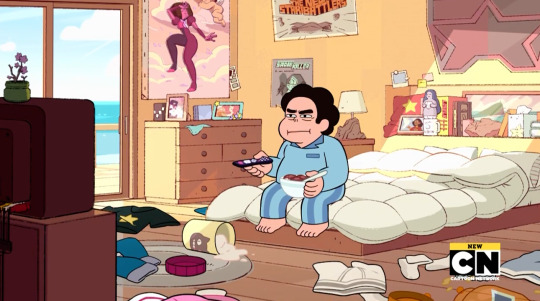
ok first things first, someone hug this boy immediately. he’s sat in his room, still in his pajamas, in day time watching dog copter. this whole scene is just steven going “lol I’m sad, I’m gonna comfort eat & stay in my pajamas & watch a kids show I watched when I wasn’t as sad haha” & it’s not only upsetting, but relatable too fuck. his room is a mess along with him eating ice cream at what I assume is morning… making it his breakfast? geez steven. also idk if it’s just me here but in this shot he looks… bigger? like ignoring his body size shifting later on in the episode he looks a lot wider than he usually does when paul & drew board episodes to me, he’s rivalling etienne & maya’s steven’s wideness. did he… get chubbier from comfort eating? how much time has passed since together forever for him to put on weight if he has? this could literally just be steven slouching or his pajamas making him look bigger but as someone who is an advocate for the body positivity shown in su & suf it has me curious. I want to hug this soft, sad boy. It could also be due to how steven’s design fluctuates through the animation process, it’s never really on model all the time.

the grunting noise he makes in this scene is very distressing, as are other moments from the episode too. a glimpse at the glow-bracelet he proposed to connie with is enough to physically pain him? fuck me man. is he leaving his room where there’s already ice cream… to get more ice cream? sobs. also the puns in this shot. I cant? slow burn?! you’re evil crewniverse. not to mention his body size changing throughout this scene, god this poor lad.
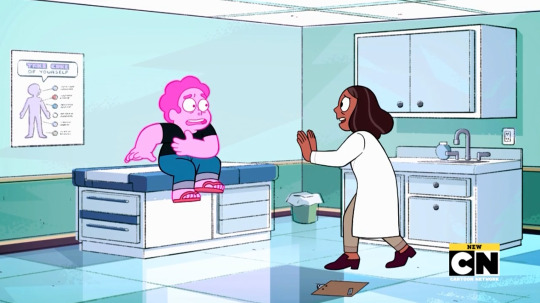
screams, this was when I started worrying. the boy is now in an environment he has never been in before & is feeling extremely uncomfortable & vulnerable. look at the lines under his eyes, his sad eyebrows & pout I hate it. also don’t even get me started on this part. the slight raise of a voice being enough to send him into panic?! fuck I hate how much I relate to that.

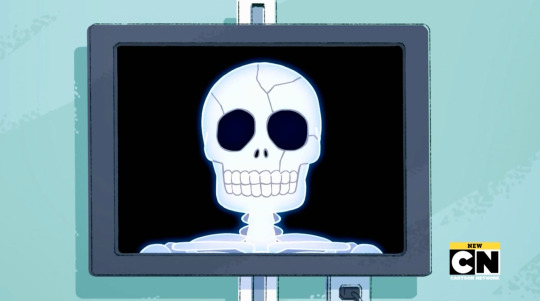
here’s where I immediately broke, no god damn pun intended. seeing steven’s skeleton, steven’s fucking skull, like this pained me. that crack on his skull is from fucking jasper in jail break. I can’t express all of the visceral emotions that were going through my body at this. there was intense sadness for steven, extreme anger at jasper & the gems for allowing shit like this to happen to him. turns out he’s not as resilient as we thought he was. each hit he takes physically breaks him & then his gem instantly heals his wounds, my heart fucking broke at this. think back to everything that happened to him, everything that physically hurt him. it broke him I can’t deal with it! then there’s what priyanka says to steven next;
“you seem to of made a series of miraculous recoveries, but that doesn't change the fact that you experienced trauma. you’ve recovered physically but, have you recovered mentally?”
this part here along with her reassuring him that there’s nothing wrong with his brain, how childhood trauma can have an impact on how your body responds to stress & how you act in your social life, the usage of the word “cortisol” too. this stuff being in a children's tv show is incredible. the writing for priyanka describes trauma simply enough for kids to understand, but for adults to fully realise too. folks, steven has ptsd. there wasn't one bit of sugarcoating about it or nothing, this is canon fact & it hurts me. for so long have I wanted steven’s emotional issues to be alked about, to not only be brought to steven’s attention but to the audience’s too.
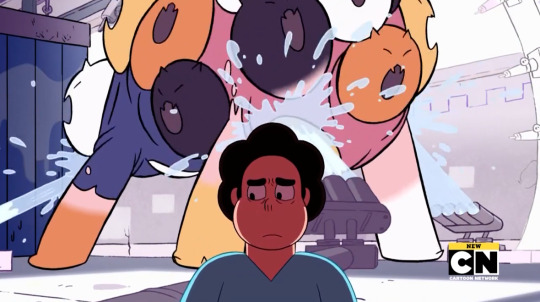
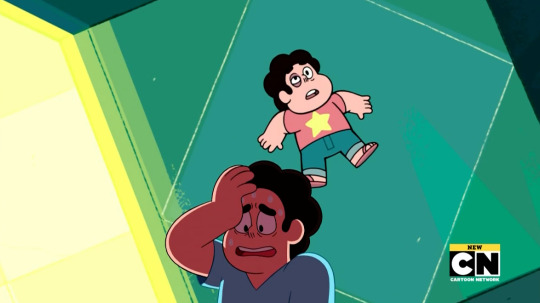
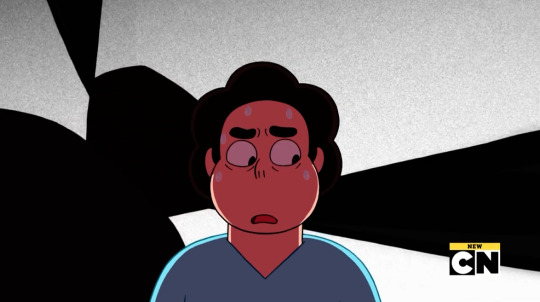
everything that has happened to him has built up to this moment. this moment where his behaviour & coping methods are finally making sense to a large majority of the fandom, & to steven himself. he’s hurting; physically, mentally & emotionally, & he isn’t coping well what so ever about it. his emotional support system is complete garbage, no one regularly checks in on him & folks just take steven at face value like “oh yea glowing pink? he’s fine it’s just steven” but he’s the bad person?! I hope a lot of you out there who genuinely believe steven is a bad person re-think yourselves after this. dealing with trauma is tough as shit. some days you even wonder if that one thing that fucked you up is really worth being labelled as trauma. I still can’t believe this is the route they’re taking, if he doesn’t get some form of therapy by the end of future I’ll be furious.

then things begin to spiral as he remembers what happened with connie. he clutches his chest in pain & begins changing size over intense amounts of stress & it was extremely distressing to watch. steven immediately reassures connie that this isn’t because of her, but because of everything else that happened to him. however. I believe that that’s a slight lie, he wouldn’t of spiralled if he hadn’t of remembered the proposal, steven you fucking himbo. he continues to reassure them both that he’s fine, just that he needs them to leave so he can calm himself enough to control himself.

then this happens.
“I. CAN’T. BE AROUND YOU RIGHT NOW!”
this was fucking intense. he means this literally in 2 ways btw. his body size shifting over the stress he’s feeling is a danger to both connie & priyanka in this moment, but it’s also because of how it started. being around connie hurts him. he’s not mad at her though let me make that very clear, just that thinking about what happened when he tired to propose to her is sending his head in a fritz. he did what he did full of confidence in together forever, for connie to then make him realise how silly he was being. these two are destined for each other, but that advice from ruby & sapphire has really fucked with him. he looks up to those 2, looks up to garnet, their relationship is so strong & stable. for them to give him that advice & to then scream “DO IT!” in his face is incredibly tasteless imo.

then greg gets here. I knew connie was calling for either greg or the gems when she was on her phone as she left the room, fuck yea connie I love you. the breathless, strained “thank you” from steven towards connie for calling his dad? g o d. connie telling him she’ll be there for him when he’s ready?! g o d. these next boards were done by rebecca, I knew immediately when I saw steven’s face. it makes sense that rebecca boarded these, because fuck.
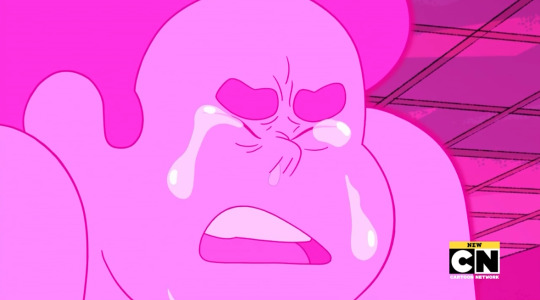
how do I move on from all of the stuff I’ve been through? how do I live life if it always feels like I’m about to die!?
I’m tearing up as I type this. when I first heard the leak of this audio I so badly wanted to believe it, but to also believe it was fake too. I was an emotional mess off & on for about 3 days over it because I couldn't stop thinking about how fucking distressing it was. like… shit steven. he seriously feels this. I can’t even begin to imagine the pain he felt just saying this in front of his fucking dad. he is hurting badly. this boy, this sweet sweet boy we’ve watched grow & develop into the person he is today is distraught about his future & life. it is… soul crushing to watch this. a group of friends of mine have found joking about the episode as a form of coping with the intensity of it & as much as that’s valid as fuck, any joke coming from this episode feels morally wrong to me. I can’t bring myself to join in it feels terrible even thinking about laughing at it to cope. I love them all, but I can’t bare myself to join them. this moment ending with greg comforting steven, telling him he’s here for him & all of his struggles, got me weeping. greg is possible the best father figure I’ve seen on tv, let alone a kids tv show. he’s amazing.

the final scene right here is lovely. greg making steven a hot chocolate & listening to him vent, reassuring him over his worry for his future. this right here is exactly what steven needs. someone to talk to, someone he could trust to talk about his feelings to. this the start of his support system, tag on peri from in dreams, bis in bismuth casual as well as connie from the past few episodes & it’s already looking great! even when greg eased him about being there for him steven still feels guilty about him leaving his tour, leaving his tour because he got a phone call from connie about his son being in need & steven feels guilty about it. fucking hell man. I did enjoy how the episode ended though, with that little moment between the both of them;
“just get some rest kiddo. you don’t have to solve all of your problems in one night.”
“yea. thanks dad.”
it’s a great message too, all of your struggles can’t be dealt with all at once. I’ve used a similar analogy before but it’s like removing a dead tree. you have to deal with all of the little things surround this issue first before you get to the deep, harder stuff. along side the message about trauma they’re both very important messages, I’m glad they exist in the show.
-------------------------------------------------------------------------------------------
one more thing before I end my thoughts & feelings over growing pains.
this ending shot;


as soon as I saw the frog mug my mind raced back to the promo for this scene, & this whole moment to come entirely. if you remember this moment has the first set of leaked audio within it, the audio of the gems basically cornering steven about him not opening up to them. christ pearl even gets mad at him for his gem building a wall behind him, protecting him from them. it’s common knowledge, I hope, that steven’s gem reacts to his emotional state. pearl herself has said this;
“I think your gem is reacting to your state of mind.”
his gem building this wall? it felt like steven was being threatened by them. this scene now has awful connotations with it. because since we now know what the pink mode is doing to steven, how actually painful it is, think back to these;
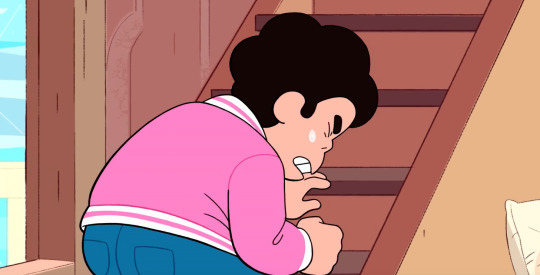

yea. fuck the gems. I’ll let it slide if steven, greg or priyanka haven’t told them about what happened at the hospital. but if they do know, if they know how much it hurts steven being in his pink mode & still press into him about it I’ll see red. with steven’s trauma & now ptsd being cemented into the show I fucking hope garnet, amethyst & pearl get held accountable for what they put on him as a kid. that shit will not slide with me if they don’t. do not condone what the gems put him through. do not condone the gems for making steven feel like he had to be his mum for them. just… don’t. please.
#thanks for coming to my ted talk lmao sdngsjfhg#this episode fucked me up in more ways than one#i dont even think ill simmer down about it before next weeks episodes either#it was… a lot... to listen & deal with#i care deeply about steven as a character#& see it being canon that he has trauma & ptsd… possible c-ptsd#it fucking breaks my heart#god dammit it crewniverse#i hope you handle this with extreme care#i trust you but still… jesus christ#steven universe#steven universe future#su spoilers#su future spoilers
803 notes
·
View notes
Note
Hello! Please give us your dish on Techno character -Rainbowchaox
(crackles toe knuckles) for you the world.
C!technoblade shows signs of C-PTSD and/or military trauma that existed before he joined the server, and possibly shared trauma with C!philza- an incomplete list by a person with C-PTSD.
(i’m going off of canon info as i understand it, bear with me)
Technoblade is a very interesting, in how CC!Technoblade’s inherent game habits translate when you realize the implications of this on Technoblade the character.
we can debate about the red festival and butcher army arcs all day, and sure, i’ll have my thoughts if you ask, but i’m speaking into what he’s had from the beginning, independent of his history on the server.
I don’t think I need to explain the implied military past. he’s very well trained and prepared as a fighter in-universe, and his military involvement in the server story has largely been through logistics and supplies rather than fighting prowess- which would not make sense for someone with a generic “fights good for money” backstory, but would make a lot of sense for a former military veteran, possibly of commanding/strategic rank.
Now for the traumatic parts.
-hoards in extreme excess, mostly in weapons/food or practical items, and he FUCKING HATES people stealing from him, especially food. he is, essentially, constantly preparing for war, constantly prepared to need to feed whatever people are in his “army”.
-incredibly resigned to the idea of having to discard/lose his possessions. he had so many things but was mentally able to disengage from them all in a heartbeat the moment he was in danger.
Never get attached. Always be ready to leave. You are guaranteed nothing. You are safe nowhere.
-he needs to be underground. He needs to be isolated. He needs to live in the uninhabitable, unreachable, untouchable. He needs to be hidden. He needs hiding spots in his hiding spots. He has hidden chests all over his house, even when he considered himself retired and largely safe.
Everywhere is a battlefield waiting to happen. If supply lines can fail, they will. If your rations can run out, they will. Be prepared for when it does, not if.
And how he treats others! Very Very Interesting.
-he has difficulty gauging people's intent and nuance, and is aware of it- this is due to being an ND character played by an ND cc, let’s not forget. he has an unfixable disadvantage in perceiving others, in cataloguing danger, and this makes him very aggressive and defensive to perceived social danger.
he’s been taken advantage of in the past. he fears it will happen again. and he knows, more likely than not, he will never see it coming.
-therefore, people who have been "dishonest" to him for any reason read as threats. someone who goes back on their word is “dishonest”, one step away from “betrayal”, one step away from a threat to techno’s life.
AND LET’S NOT GET STARTED ON PHIL.
philza’s introduction to the server, and their interactions, speak alot about their characters, and some of how techno treats philza speaks to traumatic thought patterns.
most crucially, techno treats phil as a fellow "survivor".
when a person has gone through long lasting trauma, they tend to project their coping mechanisms, traumas, and survival tactics onto people they care about.
he treats philza’s distress as his own and acts accordingly. the reason he kills baby zombies, canonically, is out of the assumption that they are a danger or trigger to philza.
technoblade’s world is a never-ending battle. philza is his fellow soldier, his co-commander, his brother in arms. in order for them to survive the battle, of course he shares absolutely everything. his supplies, his most prized possessions, his storage and strategic locations.
None of this behavior individually points to trauma, but speaking from actual experience- all of it lumped together speaks to not only trauma, but a long familiar history with it.
(i could go off about philza’s PTSD too but you asked about techno so here you go haha)
#dream smp#dsmp#dsmp techno#technoblade#c!techno#dream smp meta#dsmp meta#ptsd#dream smp analysis#c!philza#c!phil#send me questions in the askbox and i'll give you my takes. do it i dare you#aenor-llelo
1K notes
·
View notes
Text
Dream SMP Essay: c!Quackity's Conflicting Backstories
Notes:
Some of you may already know some of this, because I have already posted part of my findings on c!Q's DSMP wiki page. And to members of the Flycord, you might have already found me ranting about this in his loveposting channel a couple of days ago or so.
Everything in the context of either characters (c!) and content creators (cc!) are labelled as such. The unlabelled names would refer to instances where the situation is ambiguous and apply to both.
Citations and links to VODs will be provided as required as evidence.
Content warnings: Death, dehumanization mention, injury, mental health, trauma, violence, etc. If further tagging is needed, please message me by asks or DMs.
Currently, c!Quackity has 2 potentially-contradicting known canon backstories, the first one being juvenile prison and the second one being MCM. I will elaborate more below the cut.
Backstory A: Juvenile prison
c!Q was allegedly in juvie for either 10 or 41 years before joining the SMP. It is unknown how he ended up there in the first place, e.g. what he did to be sent there, and there is very little context to what exactly happened there, other than it being an unhappy and possibly traumatic experience for him.
From what we know, he apparently broke his legs somehow during his second night there, and possibly even every night there. He might also be claustrophobic as a result of this. Since this backstory was mostly dropped after Q's first couple of livestream appearances, and it was mostly played for laughs than for drama, it is unknown how canonical this backstory is.
There are 4 main mysteries related to this potential backstory:
As mentioned above, what did he do to get sent to juvie in the first place?
How did the leg-breaking thing even happen? There is literally zero context to how that could have happened. And every night? Who is doing this? What kind of juvie is this? Can someone please shut it down?
If this backstory were to be played dead-seriously in the current lore and plotlines, how could this have impacted him? Especially because of, you know, the Pandora's Vault arc that we have going on at present?
How was he able to contact the Triple Ts to do their "drug cartel" thing before he even joined the server? Since he was apparently, you know, in jail at the time.
Backstory B: Minecr@ft Mondays
(See video version here.)
As far as I am aware, MCM was first mentioned in the Manburg Festival stream (a year ago to this day, i.e. the day I am posting this), when c!Q explained briefly how his fear of c!Techno to the point of having a breakdown came to be. Later the same day, i.e. the same stream, c!Schlatt mentioned how he and c!Techno "go way back", citing MCM Week 6 as part of their shared pre-SMP backstory.
Later in November (real-life time), c!Q clarified how he and c!Techno first met through MCM Week 1, explaining how he hadn't heeded JunkyJanker's warning about c!Techno's rightful reputation in PVP and then getting slaughtered to the point of allegedly having PTSD. Some of you may know that stream as the one where c!Techno had his infamous 'hunters and prey' speech, by the way.
In December (real-life time), c!Q cited MCM-trauma as one of his more personal reasons for hunting c!Techno down as part of the Butcher Army. The content creators then joked about them making MCM canon to the DSMP, and while the content creators were lighthearted about it, MCM therefore became a dead-serious, fully-fledged part of the DSMP lore.
I'm not 100% sure if other Weeks of MCM are considered canonical (they might be), but there's solid confirmation to how Weeks 1 and 6 are specified to be canon. cc!Q participated in Weeks 1, 2, 6, 8, and 12 of MCM, but since I cannot find the kill records of Weeks 8 and 12, let's hypothetically take those off the list for Q-and-Techno encounters (for now, I might return if/when I get more data). In MCM Week 2, the two did not actively interact (i.e. kill each other) at any point, which leaves us with Weeks 1 and 6, and wouldn't you know it — those are the two Weeks where Quackity got murked "so many times".
Week 1: Q's deaths in Rounds 6 and 8 are both attributed to Techno, but the one in Round 8 was actually death-by-border, which doesn't really count. Round 6, however, Techno just hunted Q down to the point he had no way out, border or enchanted diamond sword to the torso. (Techno POV + Quackity POV)
Week 6: Unlike the earliest MCM Weeks, this one only had Hunger Games in Rounds 1 and 9 (beginning and end), and not every single round. Q also happened to get knocked out of the game by Techno in both rounds. (Round 1: (Quackity POV + Techno POV) (Round 9: Quackity POV + Techno POV)
I was a little skeptical at first that one encounter would lead to enough trauma to have a PTSD diagnosis, but after remembering and looking up Week 6, then taking that into consideration as well, I am not quite as skeptical of the PTSD claim anymore.
And here are an additional 6 mysteries, or details that make the MCM encounters angstier (excluding anything related to inter-worldly canon life-counts):
Schlatt was teamed with Techno during Week 6, meaning c!Q also knew him at least in passing before all three of them joined the DSMP at different times (excluding the possibility of SMP Live being canon, which opens up a different can of worms that I am not equipped to deal with). Now recall c!Q and c!Schlatt interacting again on the DSMP… no, I am not happy about this. Especially bearing in mind Schlatt during Round 9 of Week 6 (see link).
During Week 6 Round 1, after spotting Q + JunkyJanker, Techno decided to go after them and avoid Yammy and her teammate because the latter two were "sentient players". In other words… ouch.
On a funnier note, right after killing Q (in Week 6 Round 1), Techno got border-killed. TAKE THAT! Karma went and collected his debt, I suppose. /lh
Q getting bonked in Week 6 Round 9 took place in the water. If we are going with the Duck Hybrid theory that canon has provided crumbs of possible supporting evidence… ouch. Again.
On a side note, could MCM and related tournaments have caused trauma in other characters in the DSMP-verse?
Also, multiple other content creators who are now part of the DSMP also participated in MCM, e.g. Philza, Connor, BBH, Skeppy, even Dream at one point. Would MCM be counted as part of their backstories as well? How can we explain their participation in the event while still adhering to their respective canon backstories?
Compare and Contrast
It is unlikely for both of these backstories to work at the same time, due to their overlapping time frames. There is one exception to this, however, it's that c!Q was either let out of jail early, or was let out temporarily to participate in MCM for whatever reason.
The only thing that these two backstories have in common is that c!Q allegedly had PTSD from both (A and B), though we don't know if that was an official diagnosis or a self-diagnosis (for better or worse). So either way, cc!Quackity decided that he was gonna give his character canonical trauma the moment he stepped on the SMP, and then just rolled with it until the boulder was hurling unstoppably down the mountain slope.
#quackity#c!quackity#dream smp#dream smp analysis#cw trauma#cw mental health#tw death#tw injury#tw dehumanization mention#c!technoblade#technoblade#my post#17 october 2021#it is 1am by the time i post this i need sleep ffs#aqua analyzes c!quackity from the dsmp#dsmp jailbird backstory
77 notes
·
View notes
Note
My fave parts of your fic are somewhat contradictory, so I wanna thank you for writing so well that I can hold both in my heart. One of the two fave parts is Tom losing it at Jake and blaming him for not saving any of the Berensons during the war and how Jake just ends up crying. My second fave bit is when Tom gets furious at all the Animorphs for dumping their crap on Jake. (Gave me such secret vindication I felt ALIVE). Both of these are irrational anger responses, but they're both so NEEDED.
Thank you! I really wanted to incorporate Tom's temper into Eleutherophobia as much as possible. Because a) he's a Berenson, b) there are canonical mentions of real-Tom being prone to anger, and c) rage is one of those symptoms of PTSD that seems to get less talked about.
And I didn't want it to be in the form of Tom occasionally getting righteous-angry and then everyone forgiving him. I really wanted it to be him being irrational and straight-up wrong a decent percent of the time. Sometimes he recognizes that he was wrong in the moment (like when he "takes it back" after his flash of anger at Marco and Rachel in Thing from Another World) but sometimes he doesn't realize how his actions impact other people (like the kitchen scene in Ghost in the Shell), even if he does offer an apology after he's cooled down. I wanted him to have the kind of anger that sometimes breaks things and ruins things and makes him unable to see straight.
Like, there are a lot of limits to Tom's perspective. He actually supports Jake flushing the Pool ship, without ever really thinking about what Jake did or why. He has no idea that Jake would ever be traumatized by that decision, wouldn't understand it even if Jake explained outright. Tom's conception of Jake's trauma keeps coming back to "oh yeah, that one time he had a yeerk in his head for three days, must be why he's in a rough patch." Tom has no freaking clue what a blip on the radar controller-ness was for Jake, or that so much of Jake's trauma comes from Tom himself being hurt and in danger, because Tom just doesn't get things like that. Tom's worldview, for better and for worse, revolves around yeerks being the source of the world's problems and Jake being their solution. He tends to lash out at things — Margaret, Marco's vulnerability, Jake's guilt — that threaten that view.
#animorphs#eleutherophobia#eleutherophobia meta#tom berenson#animorphs fic#jake berenson#there's a certain purity to tom's experiences - all he had to do was survive#no responsibility or leadership or perpetrator guilt for our boy#tom does not grasp the fact that jake having so much ability to do whatever he wanted with the war effort was *part of the problem*#and honestly he probably never will#but if tom's allowed to feel a little jealous of marco's much easier and closer relationship with jake#then marco's entitled to a tiny bit of jealousy about how effortlessly tom understands eva and vice versa
122 notes
·
View notes
Text
the REAL dream smp experience is watching that tommy lore stream on your knees and sobbing because none of these idiot block teenagers (/rp /affectionate) have even vaguely Okay coping mechanisms
you've got the ringleader, tommy, who literally said "oh boy, do i need to get over my extreme amounts of trauma and ptsd FAST for some reason that i refuse to tell my closest friends! time to force myself to relive literally all of it! all! of it! and make my closest friends put me through it themselves WHILE STILL NOT TELLING THEM WHY!" and actually thought it'd be a good idea. and then proceeded to almost have a breakdown in the final control room and had an actual breakdown in the recreation of the prison cell
you've got tubbo, whose character and actual content creator seem to have the same mindset -- "eh, my trauma isn't that bad!" and then proceeds to make nuclear weapons and an interrogation cell in which he probably wouldn't think resorting to violent means of getting information out of people would be out of the question. he basically has mother's blindness when it comes to ranboo because he's scared of any of his close friends betraying him YET AGAIN, and his response to any sort of stress is completely blown out of proportion because HE'S ALWAYS UNDER STRESS. mans has NO SELF-PRESERVATION -- he put a suicide button on the nukes that ONLY HE KNEW ABOUT just in case things got too bad because he is WILLING TO DIE FOR BASICALLY ANY CAUSE because he was LEARNED THAT THAT'S HIS ROLE OVER TIME. "tougher skin" my ass, tommyinnit, just bc he doesn't have mental breakdowns every five minutes like you do doesn't mean he isn't as RIDICULOUSLY TRAUMATIZED as you are
and then there's ranboo -- do i really need to go into ranboo. mans tried to get himself locked in prison for his entire teenage lifetime to protect those he cared about because he believed he was a danger to them. ik cc!ranboo said that the splash potion wasn't actually just straight water splashing on him (bc he's uncomfortable w/ portraying that) and he was wearing armour, but c!ranboo still! splashed hot dense team all over him to SCARE HIM INTO HIS DEFENSIVE STATE OF MIND SO HE COULD GET ANSWERS. has literally zero sense of self-preservation at this point, possibly even as bad as tubbo's, given that when tommy got revived he LITERALLY told himself that he still has all three of his canon lives and needs to be "more reckless" with them. m. more reckless. with your LIFE?? MATE?? not to mention the constant stress he's under because he has to hide a solid 50% of what happens in his life from all the people he cares about -- being married to tubbo from techno, being in the syndicate from everyone, any and all of tommy's plans from everyone, the enderwalk from everyone, the dream thing from everyone -- y. you see what im getting at.
i was gonna end this with "puffy has a therapy office -- go there" bUT NOW THE THERAPIST IS TRAUMATIZED
CAN SOMEONE WITH A STABLE MENTAL STATE PLEASE HELP THESE CHILDREN --
#PLEASe gOd i FEEL SO BAD FOR THEM#PLEASE#JUST#GET THEM HELP#please#all three of them#stares at purpled. you. when will you get trauma.#dream smp#dream smp spoilers#tommyinnit#tubbo#tubbo_#ranboo#ranboolive#captain puffy#dreamwastaken#im so tired
195 notes
·
View notes
Text
The Importance of Antiheroes
By Brooksie C. Fontaine (me) and Sara R. McKearney
Few tropes are as ubiquitous as that of the hero. He takes the form of Superman, ethically and non-lethally thwarting Lex Luthor. Of Luke Skywalker, gazing wistfully at twin suns and waiting for his adventure to begin. In pre-Eastwood era films, a white Stetson made the law-abiding hero easily distinguishable from his black-hatted antagonists. He is Harry Potter, Jon Snow, T’Challa, Simba. He is of many incarnations, he is virtually inescapable, and he serves a necessary function: he reminds us of what we can achieve, and that regardless of circumstance, we can choose to be good. We need our heroes, and always will.
But equally vital to the life-blood of any culture is his more nebulous and difficult to define counterpart: the antihero. Whereas the hero is defined, more or less, by his morality and exceptionalism, the antihero doesn’t cleanly meet these criteria. Where the hero tends to be confident and self-assured, the antihero may have justifiable insecurities. While the hero has faith in the goodness of humanity, the anthero knows from experience how vile humans can be. While the hero typically respects and adheres to authority figures and social norms, the antihero may rail against them for any number of reasons. While the hero always embraces good and rejects evil, the antihero may do either. And though the hero might always be buff, physically capable, and mentally astute, the antihero may be average or below. The antihero scoffs at the obligation to be perfect, and our culture's demand for martyrdom. And somehow, he is at least as timeless and enduring as his sparklingly heroic peers.
Which begs the question: where did the antihero come from, and why do we need him?
The Birth of the Anti-Hero:
It is worth noting that many of the oldest and most enduring heroes would now be considered antiheroes. The Greek Heracles was driven to madness, murdered his family, and upon recovering had to complete a series of tasks to atone for his actions. Theseus, son of Poseidon and slayer of the Minotaur, straight-up abandoned the woman who helped him do it. And we all know what happened to Oedipus, whose life was so messed up he got a complex named after him.
And this isn’t just limited to Ancient Greece: before he became a god, the Mesoamerican Quetzalcoatl committed suicide after drunkenly sleeping with his sister. The Mesopotamian Gilgamesh – arguably the first hero in literature – began his journey as a slovenly, hedonistic tyrant. Shakespearian heroes were denoted with an equal number of gifts and flaws – the cunning but paranoid Hamlet, the honorable but gullible Othello, the humble but power-hungry MacBeth – which were just as likely to lead to their downfall as to their apotheosis.
There’s probably a definitive cause for our current definition of hero as someone who’s squeaky clean: censorship. With the birth of television and film as we know it, it was, for a time, illegal to depict criminals as protagonists, and law enforcement as antagonists. The perceived morality of mainstream cinema was also strictly monitored, limiting what could be portrayed. Bonnie and Clyde, The Good the Bad and the Ugly, Scarface, The Godfather, Goodfellas, and countless other cinematic staples prove that such policies did not endure, but these censorship laws divorced us, culturally, from the moral complexity of our most resonant heroes.
Perhaps because of the nature of the medium, literature arguably has never been as infatuated with moral purity as its early cinematic and T.V. counterparts. From the Byronic male love interests of the Bronte sisters, to “Doctor” Frankenstein (that little college dropout never got a PhD), to Dorian Grey, to Anna Karenina, to Scarlett O’Hara, to Holden Caulfield, literature seems to thrive on morally and emotionally complex individuals and situations. Superman punching a villain and saving Lois Lane is compelling television, but doesn’t make for a particularly thought-provoking read.
It is also worth noting, however, that what we now consider to be universal moral standards were once met with controversy: Superman’s story and real name – Kal El – are distinctly Jewish, in which his doomed parents were forced to send him to an uncertain future in a foreign culture. Captain America punching Nazis now seems like a no-brainer, but at the time it was not a popular opinion, and earned his Jewish creators a great deal of controversy. So in a manner of speaking, some of the most morally upstanding heroes are also antiheroes, in that they defied society’s rules.
This brings us to our concluding point: that anti-heroes can be morally good. The complex and sometimes tragic heroes of old, and today’s antiheroes, are not necessarily immoral, but must often make difficult choices, compromises, and sacrifices. They are flawed, fallible, and can sometimes lead to their own downfall. But sometimes, they triumph, and we can cheer them for it. This is what makes their stories so powerful, so relatable, and so necessary to the fabric of our culture. So without further ado, let’s have a look at some of pop-culture’s most interesting antiheroes, and what makes them so damn compelling.
Note: For the purposes of this essay, we will only be looking at male antiheroes. Because the hero’s journey is traditionally so male-oriented, different standards of subversiveness, morality, and heroism apply to female protagonists, and the antiheroine deserves an article all her own.
Antiheroes show us the negative effects of systematic inequalities (and what they can do to gifted people.)
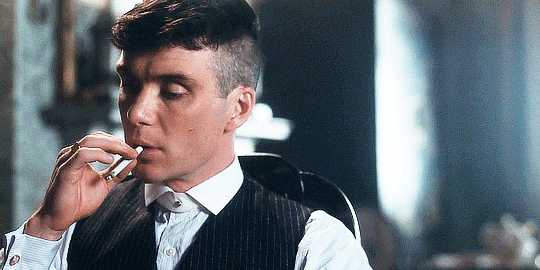
As demonstrated by: Tommy Shelby from Peaky Blinders.
Why he could be a hero: He’s incredibly charismatic, intelligent, and courageous. He deeply cares for his loved ones, has a strict code of honor, reacts violently to the mistreatment of innocents, and demonstrates surprisingly high levels of empathy.
Why he’s an antihero: He also happens to be a ruthless, incredibly violent crime lord who regularly slashes out his enemies’ eyes.
What he can teach us: From the moment Tommy Shelby makes his entrance, it becomes apparent that Peaky Blinders will not unfold like the archetypical crime drama. Evocative of the outlaw mythos of the Old West, Tommy rides across a smoky, industrialized landscape. He is immaculately dressed, bareback, on a magnificent black horse. A rogue element, his presence carries immediate power, causing pedestrians to hurriedly clear a path. You get the sense that he does not conform to this time or era, nor does he abide by the rules of society.

The ONLY acceptable way to introduce a protagonist.
Set in the decades between World War I and II, Peaky Blinders differentiates itself from its peers, not just because of its distinctive, almost Shakespearian style of storytelling, powerful visual style, and use of contemporary music, but also in the manner in which it shows that society provokes the very criminality it attempts to vanquish. Moreover, it dedicates time to demonstrating why this form of criminality is sometimes the only option for success in an unfair system. When the law wants to keep you relegated to the station in which you were born, success almost inevitably means breaking the rules. Tommy is considered one of the most influential characters of the decade because of the manner in which he embodies this phenomenon, and the reason why antiheroes pervade folklore across the decades.
Peaky Blinders engenders a unique level of empathy within its first episodes, in which we are not just immersed in the glamour of the gangster lifestyle, but we understand the background that provoked it. Tommy, who grew up impoverished and discriminated against due to his “didicoy” Romany background, volunteered to fight for his country, and went to war as a highly intelligent, empathetic young man. He returned with the knowledge that the country he had served had essentially used him and others like him as canon fodder, with no regard for their lives, well-being, or future. Such veterans were often looked down upon or disregarded by a society eager to forget the war. Having served as a tunneler – regarded to be the worst possible position in a war already beset by unprecedented brutality – Tommy’s constant proximity to death not only destroyed his faith in authority, but also his fear of mortality. This absence of fear and deference, coupled with his incredible intelligence, ambition, ruthlessness, and strategic abilities, makes him a dangerous weapon, now pointed at the very society that constructed him to begin with.
It is also difficult to critique Tommy’s criminality, when we take into account that society would have completely stifled him if he had abided by its rules. As someone of Romany heritage, he was raised in abject poverty, and never would have been admitted into situations of higher social class. Even at his most powerful, we see the disdain his colleagues have at being obligated to treat him as an equal. In one particularly powerful scene, he begins shoveling horse manure, explaining that, “I’m reminding myself of what I’d be if I wasn’t who I am.” If he hadn’t left behind society’s rules, his brilliant mind would be occupied only with cleaning stables.
However, the necessity of criminality isn’t depicted as positive: it is one of the greatest tragedies of the narrative that society does not naturally reward the most intelligent or gifted, but instead rewards those born into positions of unjust privilege, and those who are willing to break the rules with intelligence and ruthlessness. Each year, the trauma of killing, nearly being killed, and losing loved ones makes Tommy’s PTSD increasingly worse, to the point at which he regularly contemplates suicide. Cillian Murphy has remarked that Tommy gets little enjoyment out of his wealth and power, doing what he does only for his family and “because he can.” Steven Knight cites the philosophy of Francis Bacon as a driving force behind Tommy’s psychology: “Since it’s all so meaningless, we might as well be extraordinary.”

This is further complicated when it becomes apparent that the upper class he’s worked so arduously to join is not only ruthlessly exclusionary, but also more corrupt than he’s ever been. There are no easy answers, no easy to pinpoint sources of societal or personal issues, no easy divisibility of positive and negative. This duality is something embraced by the narrative, and embodied by its protagonist. An intriguingly androgynous figure, Tommy emulated the strength and tenacity of the women in his life, particularly his mother; however, he also internalized her application of violence, even laughing about how she used to beat him with a frying pan. His family is his greatest source of strength and his greatest weakness, often exploited by his enemies who realize they cannot fall back on his fear of mortality. He feels emotions more strongly than the other characters, and ironically must numb himself to the world around him in order to cope with it.
However, all hope is not lost. Creator Steven Knight has stated that his hope is ultimately to redeem Tommy, so by the show’s end he is “a good man doing good things.” There are already whispers of what this may look like: as an MP, Tommy cares for Birmingham and its citizens far more than any “legitimate” politicians, meeting with them personally to ensure their needs are met; as of last season, he attempted a Sinatra-style assassination of a rising fascist simply because it was the right thing to do. “Goodness” is an option in the world of Peaky Blinders; the only question is what form it will take on a landscape plagued by corruption at every turn.
Regardless of what form his “redemption” might take, it’s negligible that Tommy will ever meet all the criteria of an archetypal hero as we understand it today. He is far more evocative of the heroes of Ancient Greece, of the Old West, of the Golden Age of Piracy, of Feudal Japan – ferocious, magnitudinous figures who move and make the earth turn with them, who navigate the ever-changing landscapes of society and refuse to abide by its rules, simultaneously destructive and life-affirming. And that’s what makes him so damn compelling.
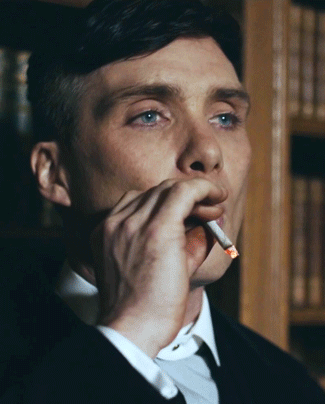
Who needs traditional morality, when you look this damn good?
Other examples:
Alfie Solomons from Peaky Blinders. Tommy’s friend and sometimes mortal enemy, the two develop an intriguing, almost romantic connection due to their shared experiences of oppression and powerful intellects. Steven Knight has referred to Alfie as “the only person Tommy can really talk to,” possibly because he is Tommy’s only intellectual equal, resulting in a strange form of spiritual matrimony between the two.
Omar Little from The Wire, an oftentimes tender and compassionate man who cares deeply for his loved ones, and does his best to promote morality and idealism in a society which offers him few viable methods of doing so. He may rob drug dealers at gunpoint, but he also refuses to harm innocents, dislikes swearing, and views his actions as a method of decreasing crime in the area.
Chiron from Moonlight, a sensitive and empathetic young man who became a drug dealer because society had provided him with virtually no other options for self-sustenance. The same could be said for Chiron’s mentor and father figure, Juan, a kind and nurturing man who is also a drug dealer.
To a lesser extent, Tony from The Sopranos, and other fictional Italian American gangsters. The Sopranos often negotiates the roots of mob culture as a response to inequalities, while also holding its characters accountable for their actions by pointing out that Tony and his ilk are now rich and privileged and face little systematic discrimination.
Walter White from Breaking Bad – an underpaid, chronically disrespected teacher who has to work two jobs and still can’t afford to pay for medical treatment. More on him on the next page.
Antiheroes show us how we can be the villains.
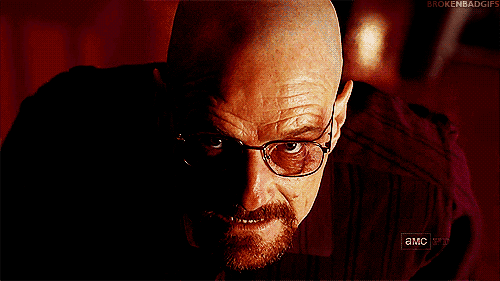
As demonstrated by: Walter White from Breaking Bad.
Why he could be a hero: He’s a brilliant, underappreciated chemist whose work contributed to the winning of a Nobel Prize. He’s also forging his own path in the face of incredible adversity, and attempting to provide for his family in the event of his death.
Why he’s an antihero: In his pre-meth days, Walt failed to meet the exceptionalism associated with heroes, as a moral but socially passive underachiever living an unremarkable life. At the end of his transformation, he is exceptional at what he does, but has completely lost his moral standards.
What he can teach us: G.K. Chesterton wrote, “Fairy tales do not tell children that the dragons exist. Children already know that dragons exist. Fairy tales tell children the dragons can be killed.” Following this analogy, it is equally important that our stories show us we, ourselves, can be the dragon. Or the villain, to be more specific, because being a dragon sounds strangely awesome.
Walter White of Breaking Bad is a paragon of antiheroism for a reason: he subverts almost every traditional aspect of heroism. From the opening shots of Walt careening along in an RV, clad in tighty whities and a gas mask, we recognize that he is neither physically capable, nor competent in the manner we’ve come to expect from our heroes. He is not especially conventionally attractive, nor are women particularly drawn to him. He does not excel at his career or garner respect. As the series progresses, Walt does develop the competence, confidence, courage, and resilience we expect of heroes, but he is no longer the moral protagonist: he is self-motivated, vindictive, and callous. And somehow, he still remains identifiable, which is integral to his efficacy.
But let us return to the beginning of the series, and talk about how, exactly, Walt subverts our expectations from the get-go. Walt is the epitome of an everyman: he’s fifty years old, middle class, passive, and worried about identifiable problems – his health, his bills, his physically disabled son, and his unborn baby. Whereas Tommy Shelby’s angelic looks, courage, and intellect subvert our preconceptions about what a criminal can be, Walt’s initial unremarkability subverts our preconceptions about who can be a criminal. The hook of the series is the idea that a man so chronically average could make and distribute meth.
Just because an audience is hooked by a concept, however, does not mean that they’ll necessarily continue watching. Breaking Bad could have easily veered into ludicrosity, if it weren’t for another important factor: character. Walt is immediately and intensely relatable, and he somehow retains our empathy for the entirety of the series, even at his least forgivable.
When we first meet Walt, his talents are underappreciated, he’s overqualified for his menial jobs, chronically disrespected by everyone around him, underpaid, and trapped in a joyless, passionless life in which the highlight of his day is a halfhearted handjob from his distracted wife. And to top it all off? He has terminal lung cancer. Happy birthday, Walt.
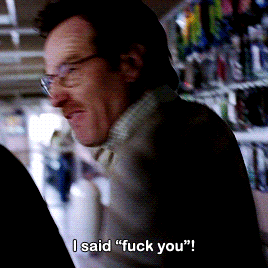
We root for him for the same reason we root for Dumbo, Rudolph, Harry Potter: he’s an underdog. The odds are stacked against him, and we want to see him triumph. Which is why it’s cathartic, for us and for Walt, when he finally finds a profession in which he can excel – even if that profession is the ability to manufacture incredibly high-quality meth. His former student Jesse Pinkman – a character so interesting that there’s a genuine risk he’ll hijack this essay – appreciates his skill, and this early appreciation is what makes his relationship with Jesse feel so much more genuine than Walt’s relationship with his family, even as their dynamic becomes increasingly unhealthy and Walt uses Jesse to bolster his meth business and his ego. This deeply dysfunctional but heartfelt father-son connection is Walt’s tether to humanity as he becomes increasingly inhumane, while also demonstrating his descent from morality. It has been pointed out that one can gauge how far-gone Walt is from his moral ideals by how much Jesse is suffering.
But to return to the initial point, it is imperative that we first empathize with Walt in order to adequately understand his descent. Aside from the fact that almost all characters are more interesting if the audience can or wants to empathize with them, Walt’s relatability makes it easy to understand our own potential for toxic and destructive behaviors. We are the protagonist of our own story, but we aren’t necessarily its hero.
Similarly, we understand how easily we can justify destructive actions, and how quickly reasonable feelings of anger and injustice swerve into self-indulgent vindication and entitlement. Walt claims to be cooking meth to provide for his family, and this may be partially true; but he also denies financial help from his rich friends out of spite, and admits later to his wife Skylar that he primarily did it for himself because he was good at it and “it made (him) feel alive.”
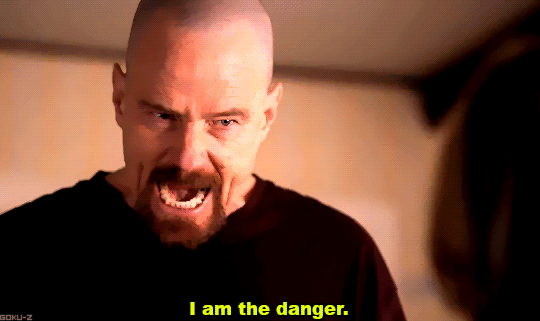
This also forces us to examine our preconceptions, and essentially do Walt’s introspections for him: whereas Peaky Blinders emphasize the fact that Tommy and his family would never have been able to achieve prosperity by obeying society’s laws, Walt feels jilted out of success he was promised by a meritocratic system that doesn’t currently exist. He has essentially achieved our current understanding of the American dream – a house with a pool, a beautiful wife and family, an honest job – but it left him unable to provide for his wife and children or even pay for his cancer treatment. He’s also unhappy and alienated from his passions and fellow human beings. With this in mind, it’s understandable – if absurd – that the only way he can attain genuine happiness and excel is through becoming a meth cook. In this way, Breaking Bad is both a scathing critique of our current society, and a haunting reminder that there’s not as much standing between ourselves and villainy as we might like to believe.
So are we all slaves to this system of entitlement and resentment, of shattered and unfulfilling dreams? No, because Breaking Bad provides us with an intriguing and vital counterpoint: Jesse Pinkman. Whereas Walt was bolstered with promises that he was gifted and had a bright future ahead of him, Jesse was assured by every authority figure in his life that he would never amount to anything. However, Jesse proves himself skilled at what he’s passionate about: art, carpentry, and of course, cooking meth. Whereas Walt perpetually rationalizes and shirks responsibility, Jesse compulsively takes responsibility, even for things that weren’t his fault. Whereas Walt found it increasingly acceptable to endanger or harm bystanders, Jesse continuously worked to protect innocents – especially children – from getting hurt. Though Jesse suffered immensely throughout the course of the show – and the subsequent movie, El Camino – the creators say that he successfully made it to Alaska and started a carpentry business. Some theorists have supposed that Jesse might be a Jesus allegory – a carpenter who suffers for the sins of others. Regardless of whether this is true, it is interesting, and amusing to imagine Jesus using the word “bitch” so often. Though he didn’t get the instant gratification of immediate success that Walt got, he was able to carve (no pun intended – carpentry, you know) a place for himself in the world.
Jesse isn’t a perfect person, but he reminds us that improving ourselves and creating a better life is an option, even if Walt’s rise to power was more initially thrilling. So take heart: there’s a bit of Heisenberg in all of us, but there’s also a bit of Jesse Pinkman.
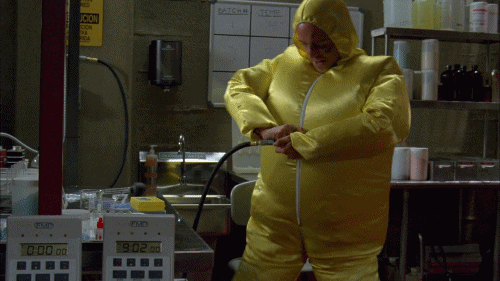
The savior we all need, but don’t deserve.
Other examples:
Bojack from Bojack Horseman. Like Walt, the audience can’t help but empathize with Bojack, understand his decision-making, and even see ourselves in him. However, the narrative ruthlessly demonstrates the consequences of his actions, and shows us how negatively his selfishness and self-destructive qualities impact others.
Again, Tony Soprano. Tony, even at his very worst, is easy to like and empathize with. Despite his position as a mafia Godfather, he’s unfailingly human. Which makes the destruction caused by his actions all the more resonant.
Antiheroes emphasize the absurdity of contemporary culture (and how we must operate in it.)

As demonstrated by: Marty Byrde from Ozark.
Why he could be a hero: He’s a loving father who ultimately just wants to provide for and ensure the safety of his family. He’s also fiercely intelligent, with excellent negotiative, interpersonal, and strategic skills that allows him to talk his way out of almost any situation without the use of violence.
Why he’s an antihero: He launders money for a ruthless drug cartel, and has no issue dipping his toes into various illegal activities.
Why he’s compelling: Marty is an antihero of the modern era. He has a remarkable ability to talk his way into or out of any situation, and he’s also a master of using a pre-constructed system of rules and privileges to his benefit.
In the very first episode, he goes from literally selling the American Dream, to avoiding murder at the hands of a ruthless drug cartel by planning to launder money for them in the titular Ozarks. Despite his long history of dabbling in illegality, Marty has no firearms – a questionable choice for someone on the run from violent drug kingpins, but a testament to his ability to rely on his oratory skills and nothing else. He doesn’t hesitate to engage an apparently violent group of hillbillies to request the return of his stolen cash, because he knows he can talk them into giving it back to him. The only time he engages other characters in physical violence, he immediately gets pummeled, because physical altercation has never been his form of currency. Not that he’s subjected to physical violence particularly often, either: Marty is a master of the corporate landscape, which makes him a master of the criminal landscape. He is brilliant at avoiding the consequences of his actions.

It’s easy to like and admire Marty for his cleverness, for being able to escape from apparently impermeable situations with words as his only weapon. He’s got a reassuring, dad-ly sort of charisma that immediately endears the viewer, and offers respite from the seemingly endless threats coming from every direction. He unquestionably loves his family, including his adulterous wife. As such, it’s easy to forget that Marty is being exploited by the same system that exploits all of us: crony capitalism. The polar opposite of meritocratic capitalism – in which success is based on hard work, ingenuity, and, hence the name, merit – crony capitalism benefits only the conglomerates that plague the global landscape like cancerous warts, siphoning money off of workers and natural capital, keeping them indentured with basic necessities and the idle promise of success.
Marty isn’t benefiting from his hard work in the Ozarks. Everything he makes goes right back to the drug cartel who continuously threatens the life of him and his family. He is rewarded for his efforts with a picturesque house, a boat, and the appearance of success, but he is not allowed to keep the fruits of his labor. Marty may be an expert at navigating the corporate and criminal landscape, but it still exploits him. In this manner, Marty embodies both the American business, the American worker, and a sort of inversion of the American dream.
In this same manner, Marty, the other characters, and even the Ozarks themselves embody the modern dissonance between appearance and reality. Marty’s family looks like something you’d respect to see on a Christmas card from your DILF-y, successful coworker, but it’s bubbling with dysfunctionality. His wife is cheating on him with a much-older man, and instead of confronting her about it, he first hired a private investigator and then spent weeks rewatching the footage, paralyzed with options and debating what to do. The problem somewhat solves itself when his wife’s lover is unceremoniously murdered by the cartel, and Wendy and Marty are driven into a sort of matrimonial business partnership motivated by the shared interest of protecting their children, but this also further demonstrates how corporate even their family dealings have become. His children, though precocious, are forced to contend with age-inappropriate levels of responsibility and the trauma of sudden relocation, juxtaposed with a childhood of complete privilege up until this point.
Conversely, the shadow of the Byrde family is arguably the Langmores. Precocious teenagers Ruth and Wyatt can initially be shrugged off as local hillbillies and budding con-artists, but much like the Shelby family of the Peaky Blinders, they prove to be extremely intelligent individuals suffering beneath a society that doesn’t care about their stifled potential. Systemic poverty is a bushfire that spreads from one generation to the next, stoked by the prejudices of authority figures and abusive parental figures who refuse to embrace change out of a misguided sense of class-loyalty.
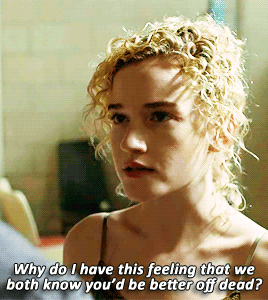
Almost every other character we meet eventually inverts our expectations of them: from the folksy, salt-of-the-earth farmers who grow poppies for opium and murder more remorselessly than the cartel itself, to the cookie-cutter FBI agent whose behavior becomes increasingly volatile and chaotic, to the heroin-filled Bibles handed out by an unknowing preacher, to the secrets hidden by the lake itself, every detail conveys corruption hidden behind a postcard-pretty picture of tranquility and success.
Marty’s awareness of this illusion, and what lurks behind it, is perhaps the greatest subversion of all. Marty knows that the world of appearance and the world of reality coexist, and he was blessed with a natural talent for navigating within the two. Like Walter White, Marty makes us question our assumptions about who a criminal can be – despite the fact that many successful, attractive, middle-aged family men launder money and juggle criminal activities, it’s still jarring to witness, which tells us something about how image informs our understanding of reality. Socially privileged, white-collar criminals simply have more control over how they’re portrayed than an inner-city gang, or impoverished teenagers. However, unlike Walt, Marty’s criminal activities are not any kind of middle-aged catharsis: they’re a way of life, firmly ingrained in the corporate landscape. They were present long before he arrived on the scene, and he knows it. He just has to navigate them.
Just like our shining, messianic heroes can teach us about truth, justice, and the American way, so too does each antihero have something to teach us: they teach us that society doesn’t reward those who follow its instructions, nor does it often provide an avenue of morality. Even if you live a life devoid of apparent sin, every privilege is paid for by someone else’s sacrifice. But the best antiheroes are not beacons of nihilism – they show us the beauty that can emerge from even the ugliest of situations. Peaky Blinders is, at its core, a love story between Tommy Shelby and the family he crawled out of his grave for, just as Breaking Bad is ultimately a deeply dysfunctional tale of a father figure and son. Ozark, like its predecessors, is about family – the only authenticity in a society that operates on deception, illusion, and corruption. They teach us that even in the worst times and situations, love can compel us, redeem us, bind us closer together. Only then can we face the dragons of life, and feel just a bit more heroic.
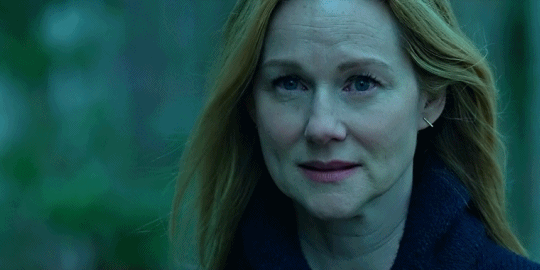
Other examples:
Don Draper from Mad Men. A similarly Shakespearian figure for the modern era, Don is a man who appears to have everything – perfect looks, a beautiful wife and children, a prestigious job. He could have stepped out of an ad for the American Dream. And yet, he feels disconnected from his life, isolated from others by the very societal rules he, as a member of the ad agency, helps to propagate. It helps that he’s literally leading a borrowed life, inherited from the stolen identity of his deceased fellow soldier, and was actually an impoverished, illegitimate farmboy whose childhood abuse permanently damaged his ability to form relationships. The Hopper-esque alienation evoked by the world of Mad Men really deserves an essay all it’s own, and his wife Betty – whose Stepford-level mask of cheerful subservience hides seething unhappiness and unfulfilled potential – is a particularly intriguing figure to explore. Maybe in my next essay, on the importance of the antiheroine.

#my writing tips#writing tips#tommy shelby#peaky blinders#walter white#breaking bad#jesse pinkman#bojack horseman#don draper#writing advice#antihero#the types of antiheroes#long post for ts
984 notes
·
View notes
Text

Hello and welcome to the beginning of (human!) Nelyo* posts about the Wanderings of Húrin. I also went into the next page not featured here.
(edit: now also going by the name of Thalion because one tortured kinslayer wasn’t enough apparently!)
warnings: discussion of canonical torture and captivity, and death, c-PTSD
also I say fuck a few times because I got angry at Morgoth and at Lorgan
Brief Context: The Wanderings of Húrin is a section of The War of the Jewels, the Eleventh Volume of The Histories of Middle Earth. Like most of the histories it is somewhat scattered, filled with Christopher Tolkien’s notes and edits as well as notes from JRRT himself. The section takes place about a year after the deaths of Húrin’s children and details Húrin’s release from Angband and his subsequent travels. It ends before his venturing to Doriath but hints at events that will lead him there. Despite the scattered format it still manages to be utterly depressing!
Also it has a trial scene which, when I read the first time, I was honestly not expecting! Also that scene is...wild. Not a very good word but I can’t think of a better one.
I’m actually really nervous about this I hope this is an ok post
masterlist
edit: post here on how much a trauma informed reading hurts!
Second edit: started an analysis of the trial of Húrin Thalion, part one is here
I think it’s fair to say I’ve written Morgoth doing some pretty awful things, I’ve exchanged vile ideas of all sorts...and I don’t think any of them have quite made me feel the indignant rage that this scene has. It’s almost irrational, at least on the surface...why would one of the scenes that makes me angriest at Morgoth be one where he’s letting someone go?
the answer is of course rather obvious; it’s a gesture of mockery, a gloating taunt at Húrin. It’s the sheer confidence Melkor has that his captive has broken completely.
The text says “he feigned that he was moved in generosity towards a defeated enemy” but, I hope you’ll excuse my language here, no one fucking believes that, Húrin certainly doesn’t as it says in the next line.
And this is always struck me as an odd detail for a number of reasons
.first and foremost Morgoth fits the trope of faux-affably evil in that he can to some extent perform charisma or a friendliness in order to get what he wants
But with the possible exception of him pretending to be remorseful for his own deeds when he sees for pardon pity or compassion aren’t really things he even bothers to pretend to have because they are so far removed from his presentation as a whole
Perhaps I’m biased but I feel it is rather unfairly framed; Húrin didn’t believe Morgoth was acting out of pity but went forth, embittered by the lies of the Dark Lord. I don’t doubt that he was indeed embittered by the lies but I don’t really see what his alternative was? To insist on staying in Angband?
And then he is taken with a guard to a place and left there with a staff (and a fell light in his eyes) and nearly three decades of horrific trauma culminating in the deaths of his children.
I also wanted to note that Húrin is kept in Angband for an entire year after the deaths of his children! I just...I don’t want to imagine what that year was like. OK anyone who knows me knows that’s not true, obviously I am imagining it quite a lot...)
The Easterlings who still inhabit the areas of Hithlum where Húrin had been a lord are agitated upon seeing him but do not attack him because they believe him to be in league with Morgoth. Húrin learns from the outlaws who live on the outskirts of his old home of the deeds of his son when he was among them. He proclaims that he has no purpose here (in Hithlum) or in Middle Earth at all save for the chance to avenge Túrin and no longer desires any lordship.
One thing that brings me...certainly not hope... not amusement but some lighter shade of it I suppose, is how, despite Húrin having to suffer the humiliation of being paraded from Angband as though he is loyal to Morgoth (”and with them came this man, as one that was held in honor”) Húrin is not held in this suspicion for long and it becomes immediately obvious that he is not at least wittingly working for or loyal to Morgoth
Of course, it becomes obvious when Húrin almost immediately has a confrontation with one of the men Morgoth has allowed his former homelands to, a man called Lorgan and his group. Húrin refuses their friendship ‘eyeing them in wrath” and is almost killed by Lorgan’s followers after offering them grave insult. Yes, just hours or so out of Angband and Húrin is already angering people with his insults. I adore him.
Unfortunately, Lorgan guesses that Morgoth has released Húrin for sinister reasons and quite literally tells him he wishes him ill and lets him go. Húrin responds with “Tol Acharn” (vengeance comes) “I am not the last of the Edain whether I fare ill or well.”
Lorgan, I hate you and I hope you suffer spring allergies for the rest of your life (like all year around) Who the fuck runs into a survivor of torture and just acts like that?? fucking Lorgan apparently.
Also to be clear Lorgan does worse stuff than just that, he also holds Tuor captive...
And look, yes, Húrin’s bitterness and sharpness of words is going to cause a lot of damage and work to Morgoth’s advantage but I do appreciate how 27 years of torment did not tamper his inability to hold his tongue. I like to think that this is somewhat of an annoyance to Melkor even if He knows that it’s going to aid him. Like an itch in his mind. Sure, Húrin’s temperament is going to be of an advantage but that doesn’t mean Melkor doesn’t resent the lack of control he has over him in all areas. Morgoth would like to have it both ways and he can’t.
I love this man so much, he causes me so much pain.
”And the remnant of his own people shunned him because of his coming from Angband as one in league and held in honor with Morgoth”
this devastating line once again reminds us of the stigma and hostility that Angband survivors face because Morgoth uses many of the as his agents, willingly or otherwise...
I also...this is pretty obvious but I just cannot overstate how profoundly such an extensive period of captivity and abuse is going to affect you. I have my series of posts exploring the aftermath of long term captivity and torture through various aspects (food and water, safety and comfort, privacy and information access, etc) that I look at through Maedhros but any of them would apply to Húrin as well and I’m going to start adding sections for him too. There’s too many to link so I’ll just link my masterlist, let me know if you need help finding any
edit: my general post for “trauma after captivity and torture” has had Húrin’s information added! You can see it here, The first part is more general and for the examples, I bolded the beginning of the points for Húrin so if you have already read Maedhros’s or you don’t want to see them they’re easier to avoid
I’m also nearly done with the part on comfort and safety which repeats briefly how unspeakably damaging an extended period of what was essentially solitary confinement is going to be. Once again I bolded the start of the section on Húrin. It’s not as good but is in the process of being edited
let’s end with a nice happy (sarcasm) quote
“The personality formed in an environment of coercive control is not well adapted to adult life. The survivor is left with fundamental problems in basic trust, autonomy, and initiative. (They) approach the tasks of adulthood, establishing independence and intimacy burdened by major impairments in self-care, in cognition and memory, in identity, and in the capacity to form stable relationships. In this way, complex trauma becomes entangled with character, chipping away at it and insidiously deforming it until it morphs into something bewildering.“ (The Unspeakable Mind by Shahili Jain)
Next up we have Morgoth is a Jerk Who Tries and Fails to Conceal the Death of Glaurung from Húrin (Morgoth’s failure still doesn’t end up being anything good for Húrin but the lengths he went through are sort of amusing I guess)
Don’t miss it!
#Húrin#the children of húrin#the silmarillion#Morgoth#Melkor#musing and meta#post Angband#the wanderings of húrin#lorgan
25 notes
·
View notes
Text
Tommy and Trauma pt.2
Take a second to think about how deeply the traumatic experiences C!Tommy has had affect him. It’s worked into the lore and canon really well in terms of acting and logistics, if you think about it. I think Tommy has PTSD.
the criteria for ptsd are as follows:
“Exposure to actual or threatened death, serious injury, or sexual violence in one (or more) of the following ways:
1) Directly experiencing the traumatic event(s).
2) Witnessing, in person, the event(s) as it occurred to others.
3) Learning that the traumatic event(s) occurred to a close family member or close friend. In cases of actual or threatened death of a family member or friend, the event(s) must have been violent or accidental.
4) Experiencing repeated or extreme exposure to aversive details of the traumatic event(s) (e.g., first responders collecting human remains; police officers repeatedly exposed to details of child abuse).”
criterion 1 is fulfilled easily with several examples:
- final control room, where he was killed by Dream due to Eret’s betrayal
- the multiple threats by Dream toward his life during exile
- the multiple threats by Dream toward Tubbo’s (and the other L’Manberg residents) life in exile
- Tommy’s second death at Dream’s hands during the duel.
criterion 2 is filled by:
-witnessing Tubbo’s death at the hands of Techno (his brother)
-witnessing Tubbo’s death (again) at the hands of Dream
-watching Dream, who already killed his best friend once, threaten the life of his friend and blame him for it
-watching Wilbur’s death at the hands of his father (in a way that was almost assisted suicide)
-seeing his home blown up not once, twice, but three times
criterion 3′s examples all come from the two aforementioned categories, similarly with criterion 4.
The next segment of ptsd diagnostic criteria is as follows:
Presence of one (or more) of the following intrusion symptoms associated with the traumatic event(s), beginning after the traumatic event(s) occurred:
1) Recurrent, involuntary, and intrusive distressing memories of the traumatic event(s). Note: In children older than 6 years, repetitive play may occur in which themes or aspects of the traumatic event(s) are expressed.
2) Recurrent distressing dreams in which the content and/or affect of the dream are related to the traumatic event(s). Note: In children, there may be frightening dreams without recognizable content.
3) Dissociative reactions (e.g., flashbacks) in which the individual feels or acts as if the traumatic event(s) were recurring. (Such reactions may occur on a continuum, with the most extreme expression being a complete loss of awareness of present surroundings.) Note: In children, trauma-specific reenactment may occur in play.
4) Intense or prolonged psychological distress at exposure to internal or external cues that symbolize or resemble an aspect of the traumatic event(s).
5) Marked physiological reactions to internal or external cues that symbolize or resemble an aspect of the traumatic event(s).
Criterion 1, 3, 4, and 5 manifest themselves in Tommy attaching himself to Techno after escaping from Logsteadshire and the domain of Dream, especially when the two go close to the ruins of Tommy’s old home and he says “I can’t be alone right now, please stay near me, Techno.” As well as when the two stumble upon the Final Control Room and Tommy has a full on flashback (unable to move, reliving the event over and over until Techno physically removes him from the triggering situation.) Even the presence of Ghostbur, (a not-quite-living reminder of the dead brother who’s suicide he witnessed), seems to evoke an almost depersonalized state in him.
Tommy also displays persistent avoidance of areas, people, and objects associated with former traumatic experiences like the final control room, logsteadshire, and even snowchester because it’s on a beach, he says, just like logsteadshire, where he would wake up drowning every morning. He would even avoid Dream and alivebur up until the point where he absolutely had to face them.
The final criteria are maladaptive thought patterns:
Negative alterations in cognitions and mood associated with the traumatic event(s), beginning or worsening after the traumatic event(s) occurred, as evidenced by two (or more) of the following:
1) Inability to remember an important aspect of the traumatic event(s) (typically due to dissociative amnesia, and not to other factors such as head injury, alcohol, or drugs).
2) Persistent and exaggerated negative beliefs or expectations about oneself, others, or the world (e.g., “I am bad,” “No one can be trusted,” “The world is completely dangerous,” “My whole nervous system is permanently ruined”).
3) Persistent, distorted cognitions about the cause or consequences of the traumatic event(s) that lead the individual to blame himself/herself or others.
4) Persistent negative emotional state (e.g., fear, horror, anger, guilt, or shame).
5) Markedly diminished interest or participation in significant activities.
6) Feelings of detachment or estrangement from others.
7) Persistent inability to experience positive emotions (e.g., inability to experience happiness, satisfaction, or loving feelings).
Tommy demonstrates almost all of these (with the possible exception of crit.1) over the course of his struggle to process the trauma mentioned earlier in this essay. He repeatedly vocalizes his persistent and exaggerated negative beliefs, literally “i am bad” and “it’s my fault”. The self-blame (in part from repeated placement of blame upon him by trusted adults), also manifests itself in alignment with criterion 3. Even now, that he has a stable life with Sam Nook and Tubbo, he struggles with the feelings of estrangement and detachment described in criterion 6.
Therefore, in accordance with the previously explained reasons, I believe Tommy in the dream smp canon, is suffering from ptsd.
thank you for coming to my ted talk.
(tommy and trauma pt.1)
#dream smp#tommyinnit#clingy duo#clingyinnit#techno#technoblade#headcanon#dream smp headcanon#hc#sam nook#wilbur soot#dsmp#mcyt#tubbo mcyt#dream#essay#analysis#musings#theory
148 notes
·
View notes
Text
Ok @the-wckd-powers inspired me to make this. These are my tsc neurodivirgent headcannins based partly on my observations from the books and also partly just vibes.
I'm not including the canon stuff like Ty bring autistic or Jace having C-pstd because.. it's canon or at least basically canon.
Christopher: I know he's cannonly nd but I personally hc him as autistic/adhd.
Lucie: Listen I personally feel like she's also autistic/adhd.
Alastair: We saw this one coming. C-PTSD. I also feel depression as well. Also someone said he's autistic and now I can't unsee it. My boy is in fact autistic. Argue with the wall.
Matthew: Depression. I wouldn't say any ptsd because I just don't really think that's the case. He has trauma sure, but trauma does not equal ptsd. Also someone who has bpd said bpd and I totally see it. For those of you who don't know, bpd is categorized by difficulties in regulating emotion. (As I understand it. I'm not diagnosed.) Also by very intense often stormy interpersonal relationships.
Clary: I hc as autistic/adhd with very minimal evidence just vibes. Sometimes you look at a character and are like... yeah you're not nt.
Alec: MY BOY IS AUTISTIC! ARGUE WITH THE WALL!
Magnus: Oh yeah he definitely has C-PTSD. By the way if you didn't know, c-ptsd is complex post traumatic stress disorder. It is categorized by exposure to REPEATED trauma, as in continuous abuse or neglect. PTSD is just for one single traumatic event.
Will: He definitely experienced depression throughout his teen years. He seems to be fine now in tlh.
Jem: I can't decide on PTSD or C-PTSD. The thing with his parents when he was s kid was one event but you could argue that living with the disease for years after was traumatic enough to give him C-PTSD. Idk. But he doesnt really show many signs of trauma after TID? (This is my issue with CC's portrayal of trauma btw. It ends when their story arc ends or they get together with their love interest. But whatever.)
Henry: Listen, I know everyone says autistic but personally I feel like he has adhd on account if the fact that he is hyper oblivious to most things and has the ability to hyper focus on his experiments.
Charlotte: GAD. Generalized anxiety disorder. Look, this women has been running the institute since she was 18, looking after Will and Jem, and Jesse's ungrateful ass. Then she became the first female consul at 23 and now she's dealing with all the misogyny from the Clave as well as being a mother of two boys. Matthew is....Matthew and Charles is.....Charles. There is no way this women didn't develop an anxiety disorder. Argue with the wall.
Kit: ADHD and C-PTSD. Obviously. I could also make a case for depression too.
Mark: ADHD. As for as I'm concerned this is basically canon. C-PTSD as well.
Kieran: Ok here's a bit of a wild card but to me it makes sense. BPD. Bpd is the result of trauma which tracks. Kieran's emotional needs were definitely not met as a child which could definitely result in emotional dysregulation as well as an intense fear of abandonment and the desire to do anything possible to prevent that abandonment.
Cristina: GAD. No evidence just vibes.
Ty: Dysgraphia and Dyscalculia because yes I am projecting but also they are both comorbid with autism. Ty is also cannonly really bad at math and has issues with writing, often pressing way too hard on the pencil which is a dysgraphia thing. Also I'm pretty sure he along with the rest of the Blackthorns are supposed to cannonly have ptsd but I don't really see it with him tbh.
Emma: PTSD.
Julian: C-PTSD.
Tavvy: Actually I would argue he has C-PTSD because he kept being exposed to terrible shit at such a young age.
Dru: C-PTSD.
Ash: C-PTSD.
Helen: C-PTSD obviously and also depression. I just get the vibes.
Jaime: I see him has autistic. I could be projecting but to me he's just giving off vibes.
Livvy: Autistic. Ty can't be the only one in seven siblings I call bullshit. Also it just makes sense go look up @the-wckd-powers and I's asks about this. Also ngl I don't feel C-PTSD for her either tbh. The twins are def traumatized but they don't seem to have PTSD.
Ok that's it. As far as I'm considered everyone else is nt. I might change my mind later on though.
@littlx-songbxrd
24 notes
·
View notes